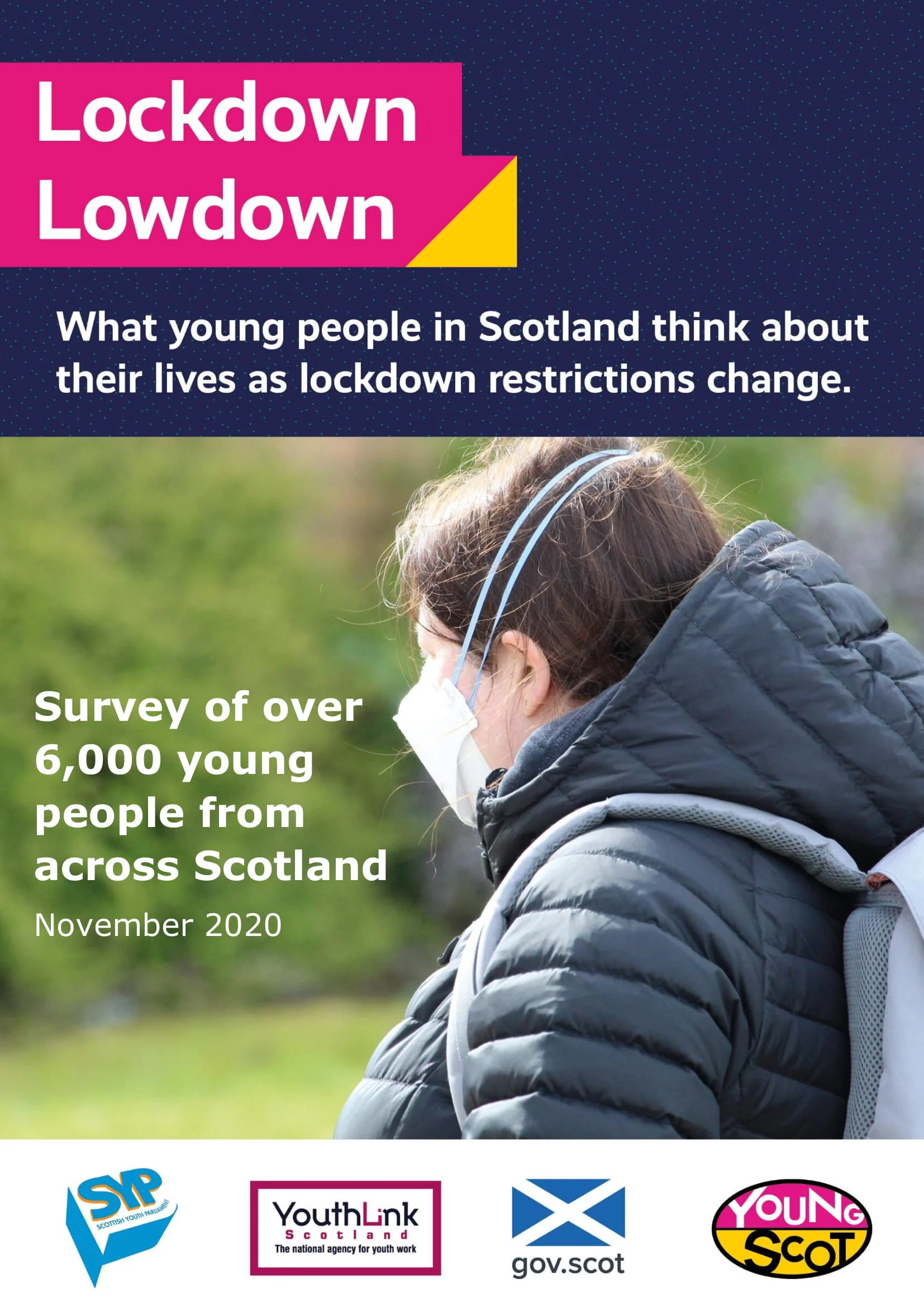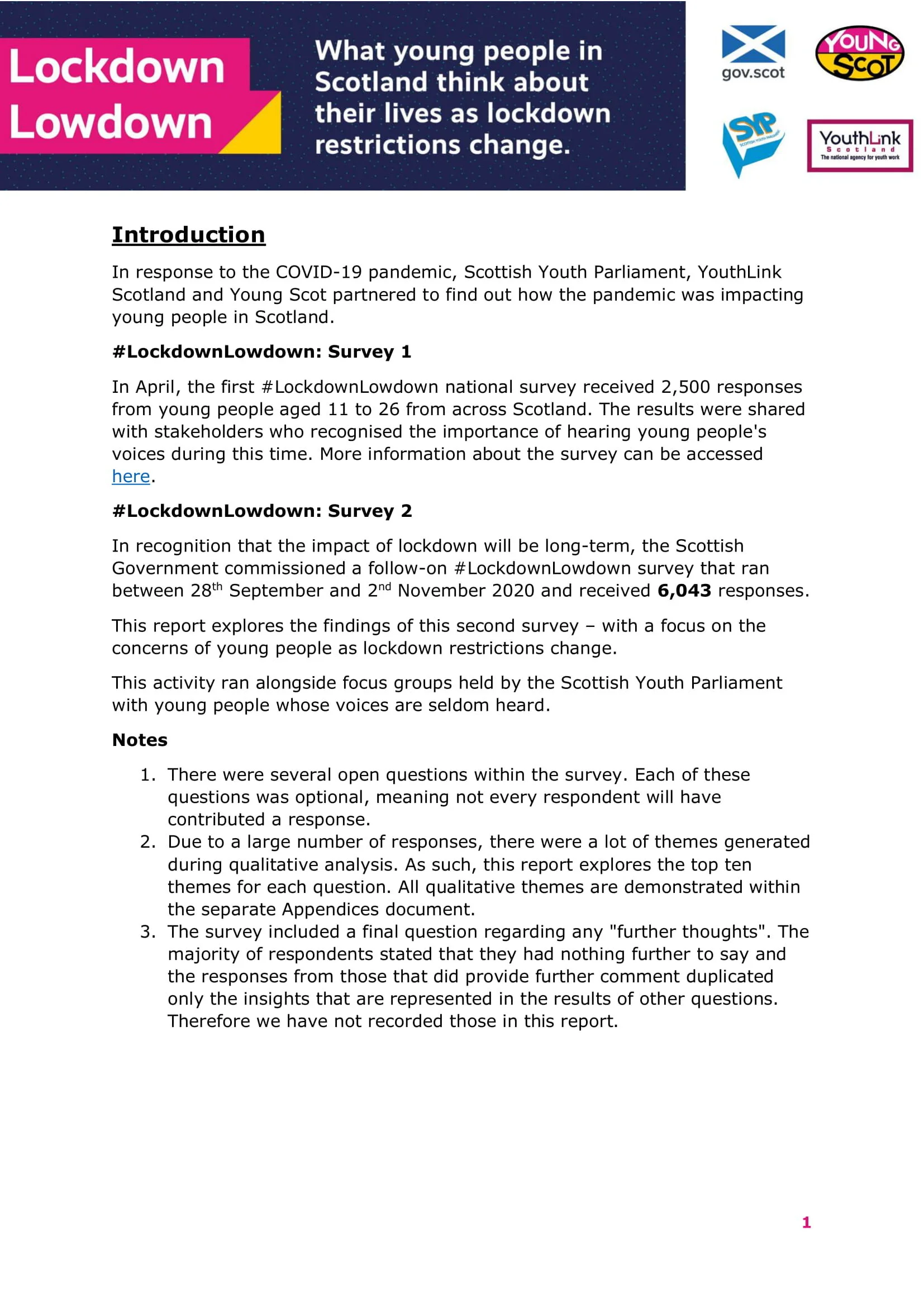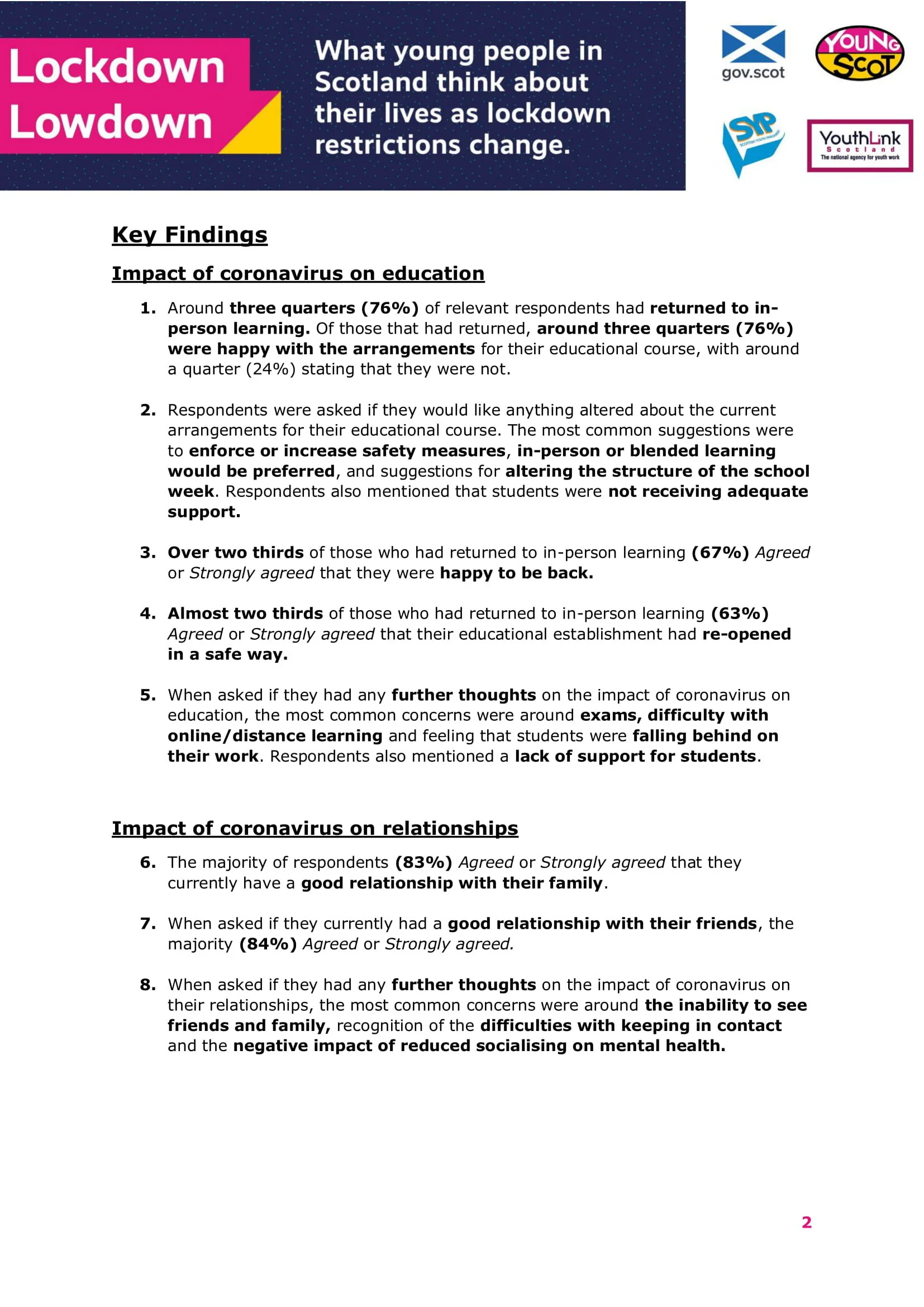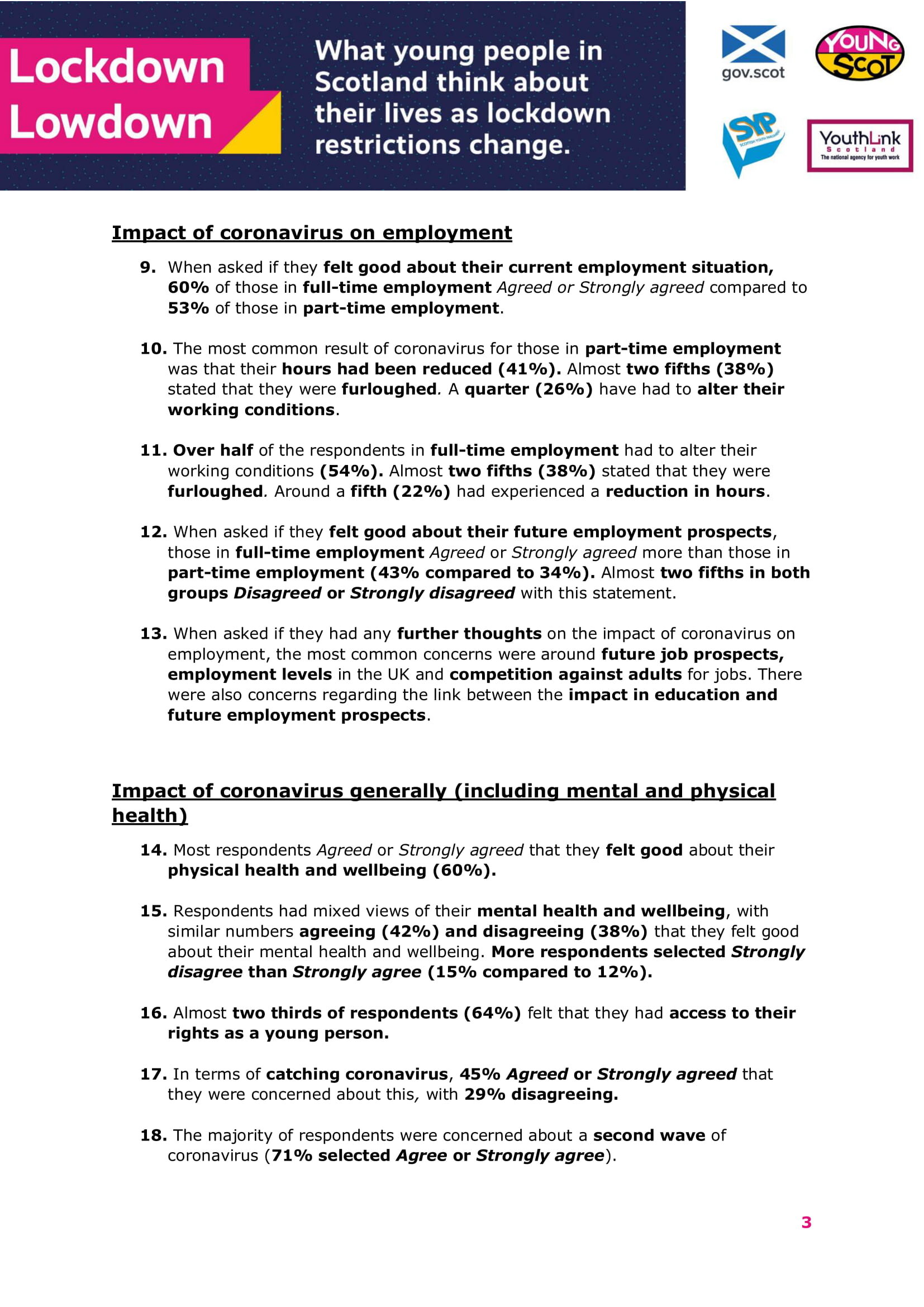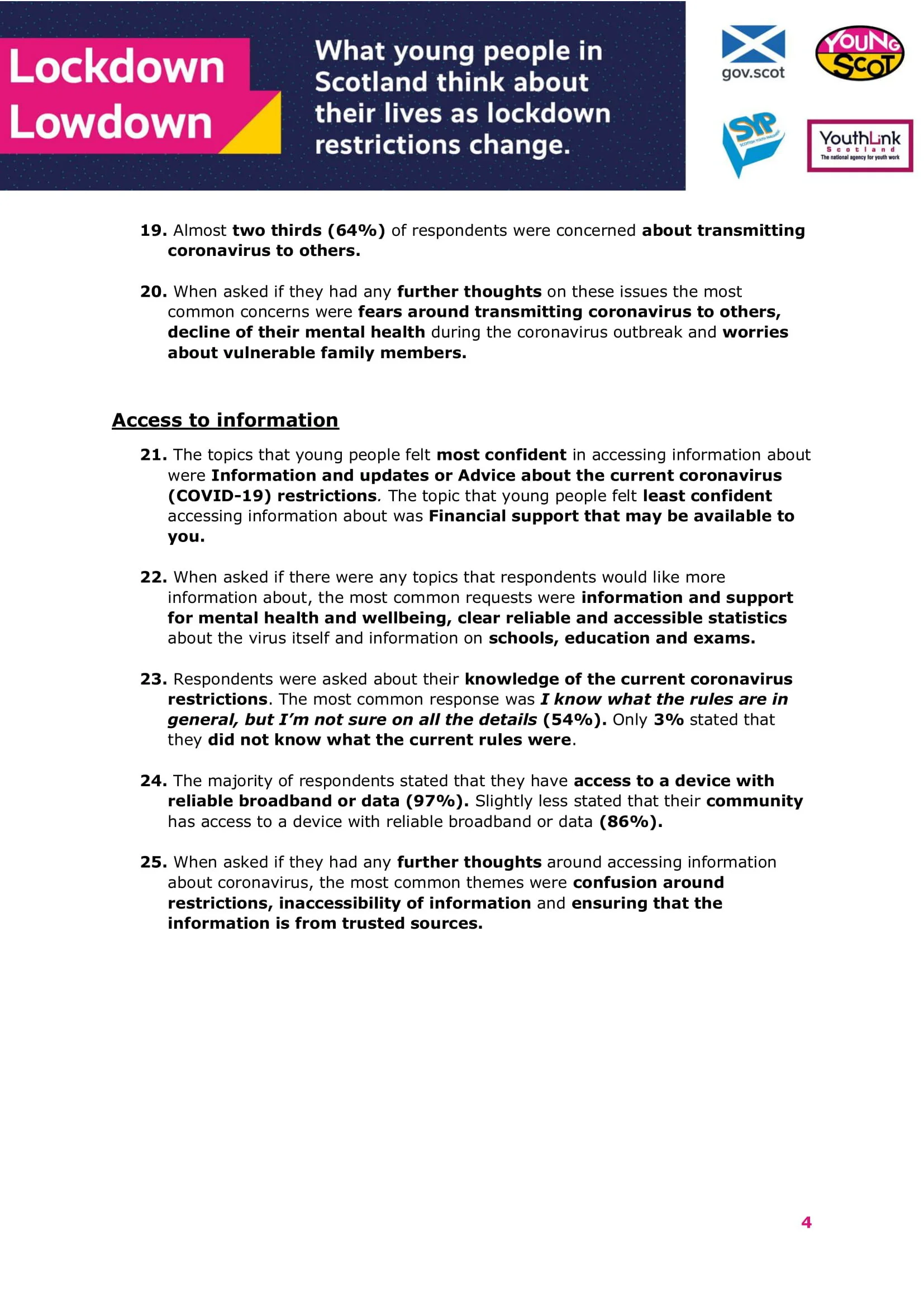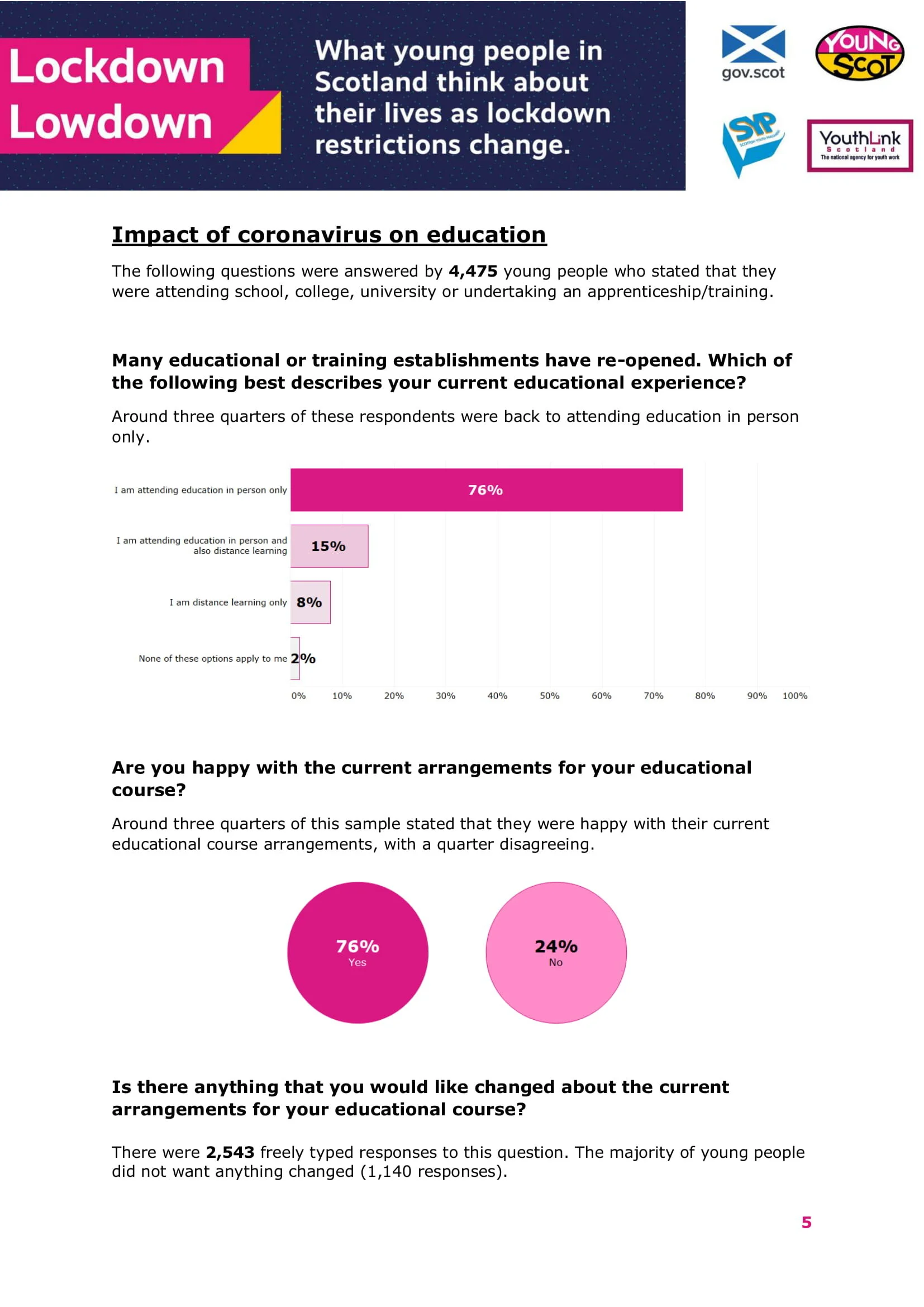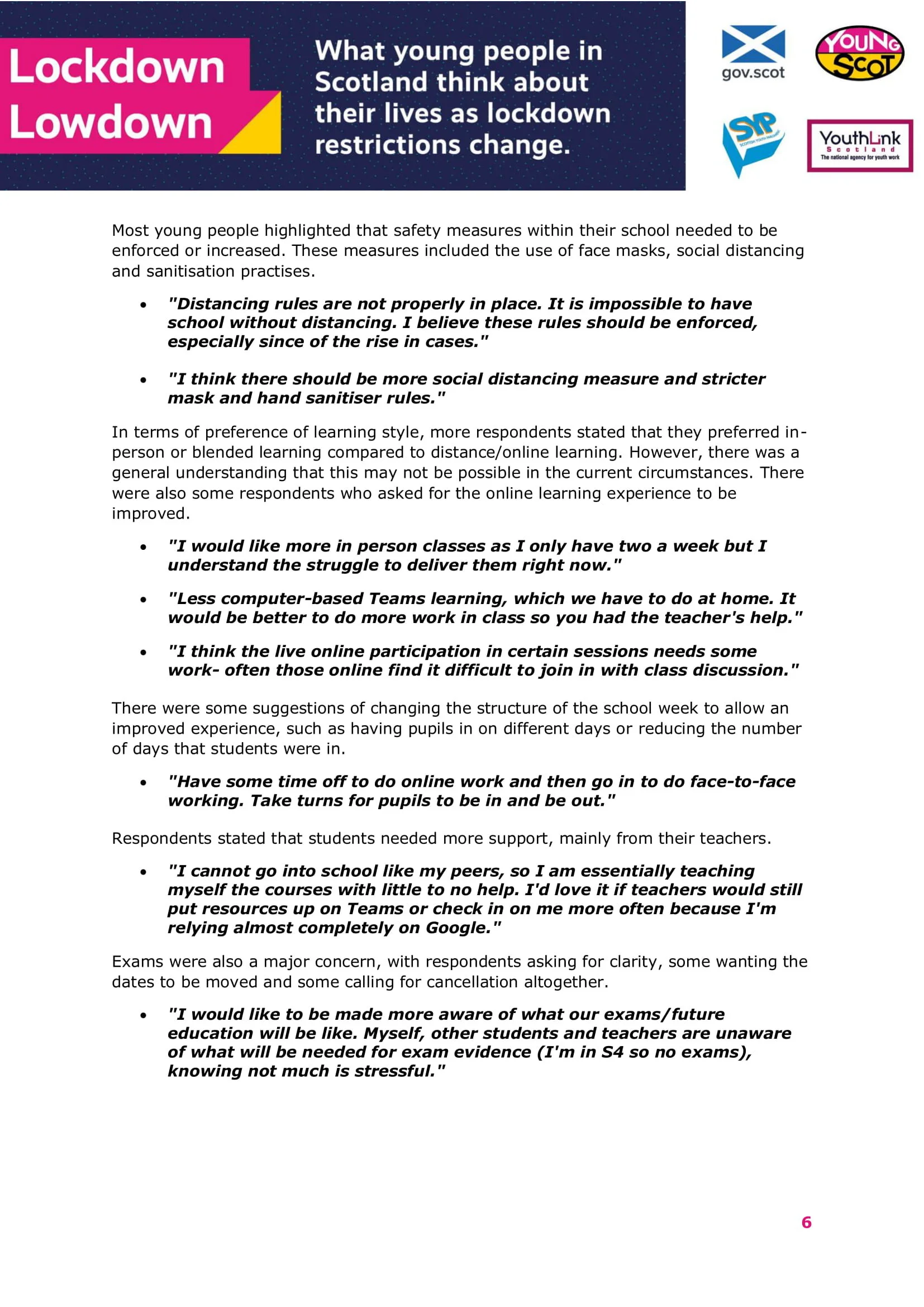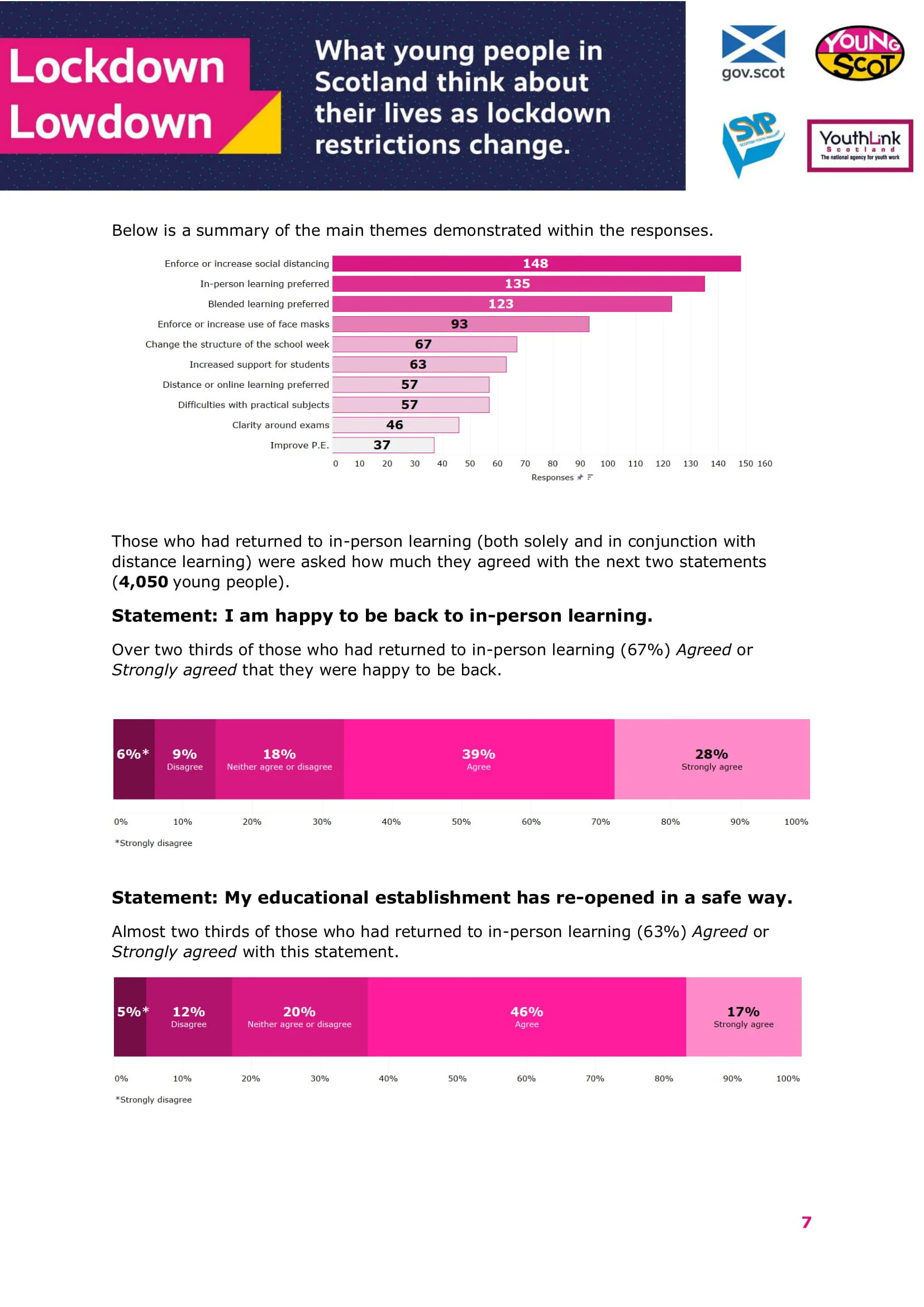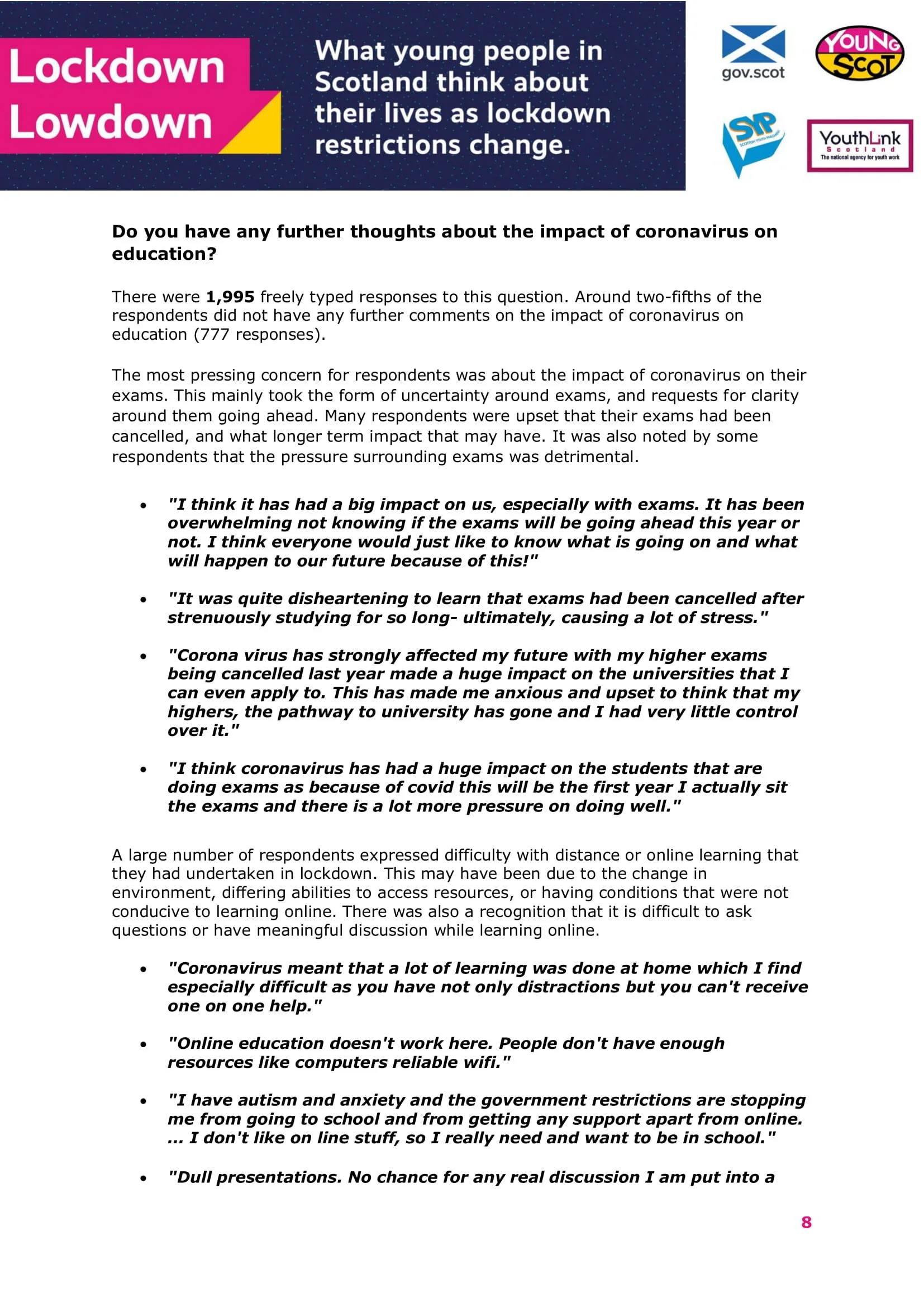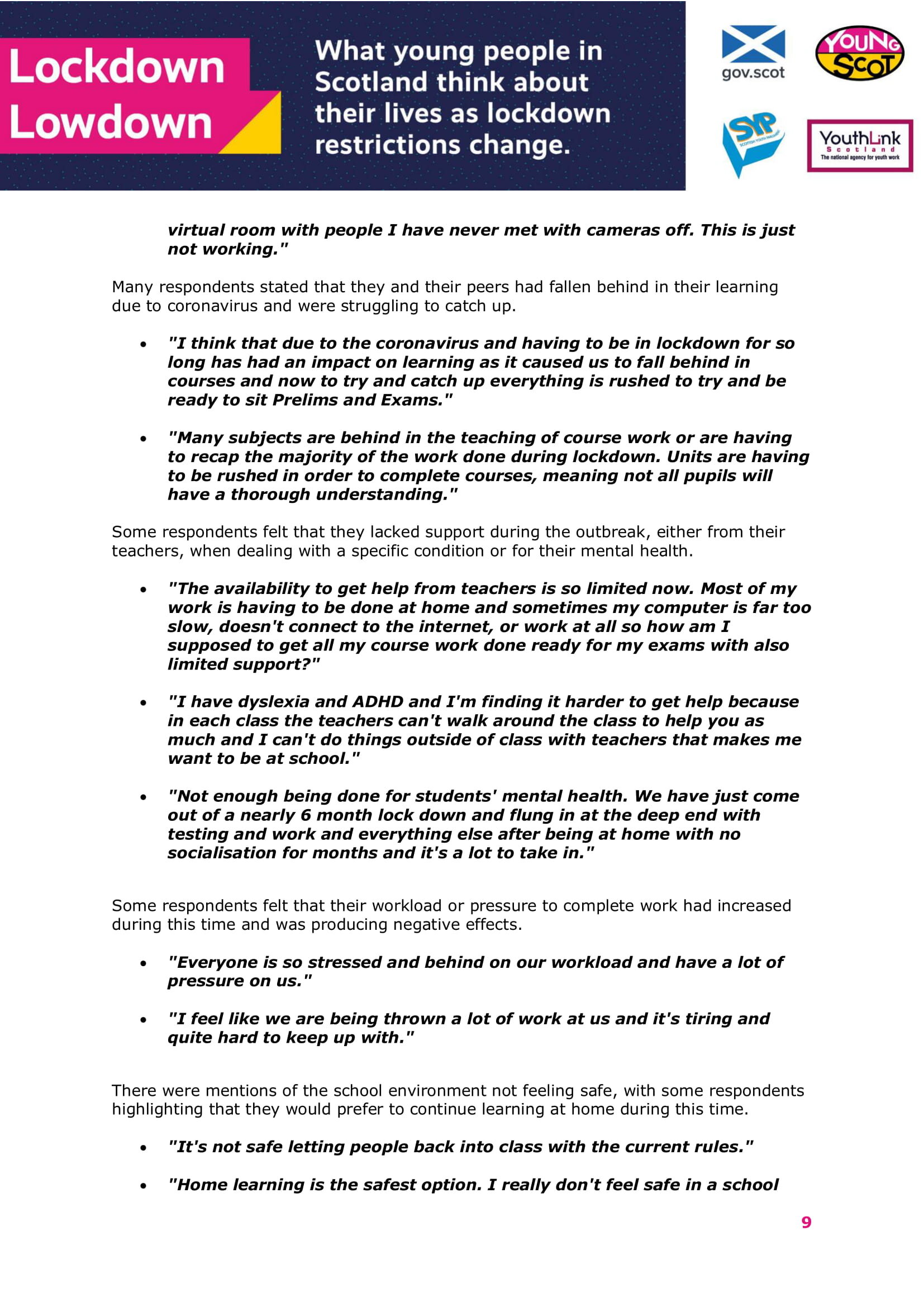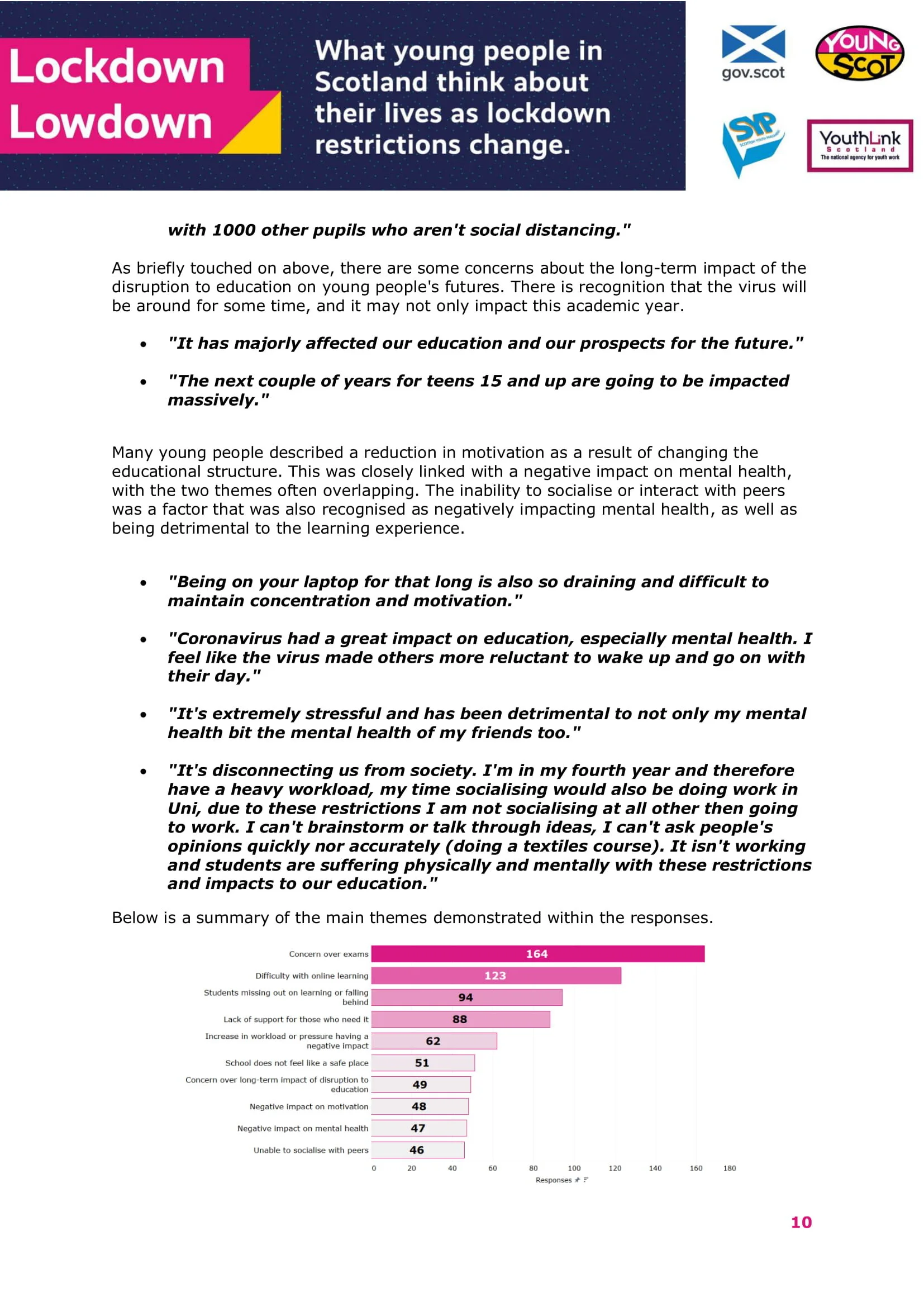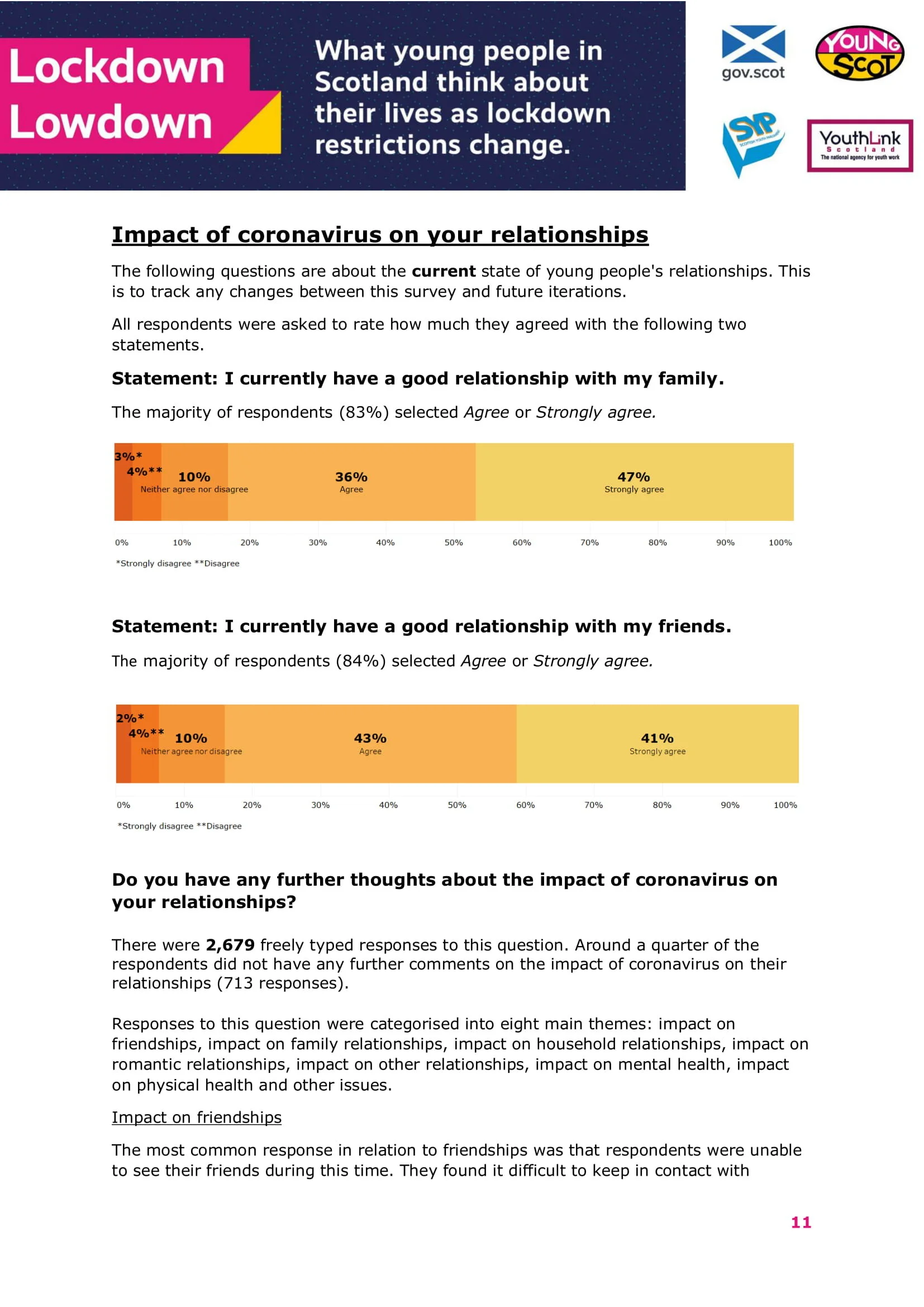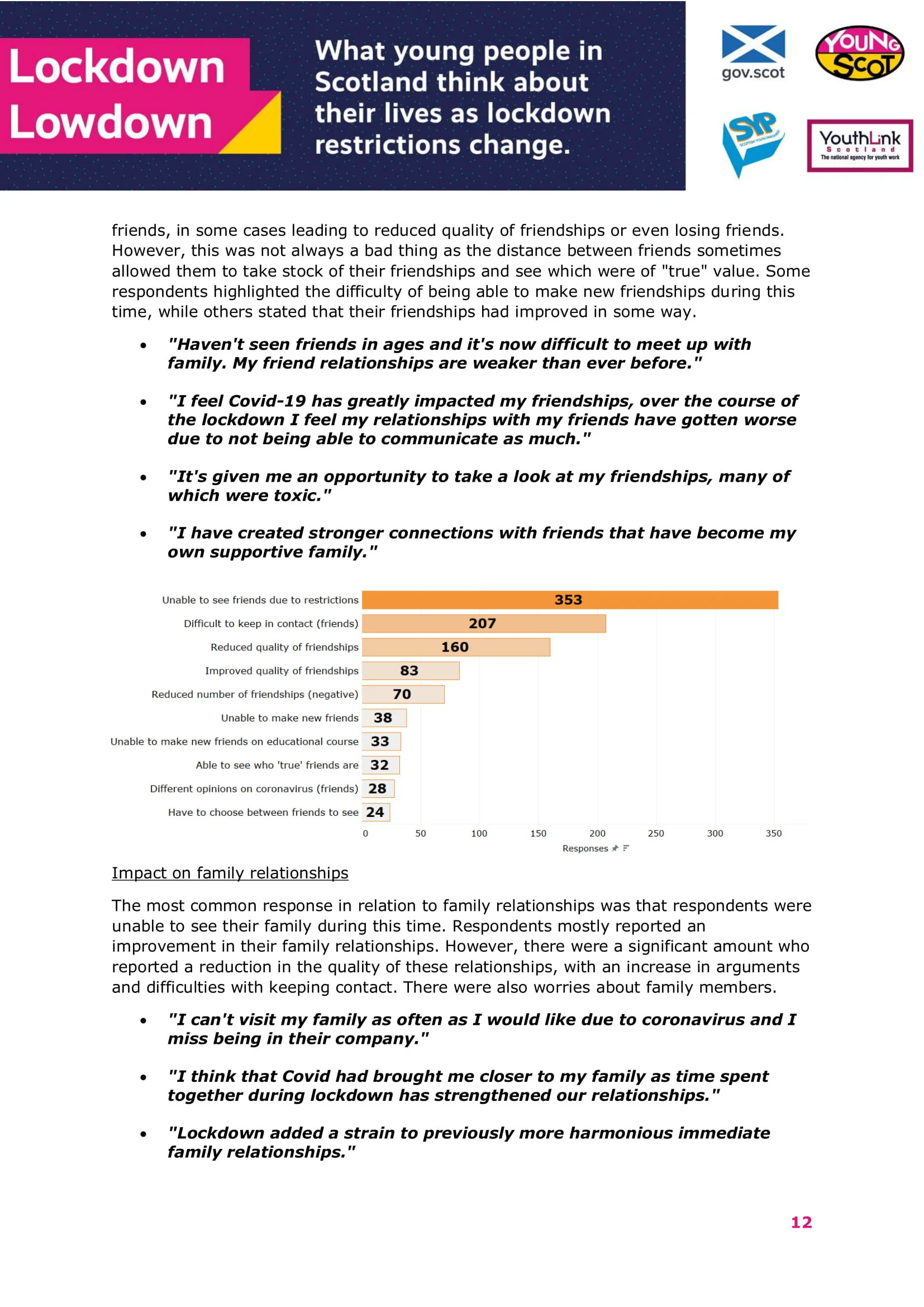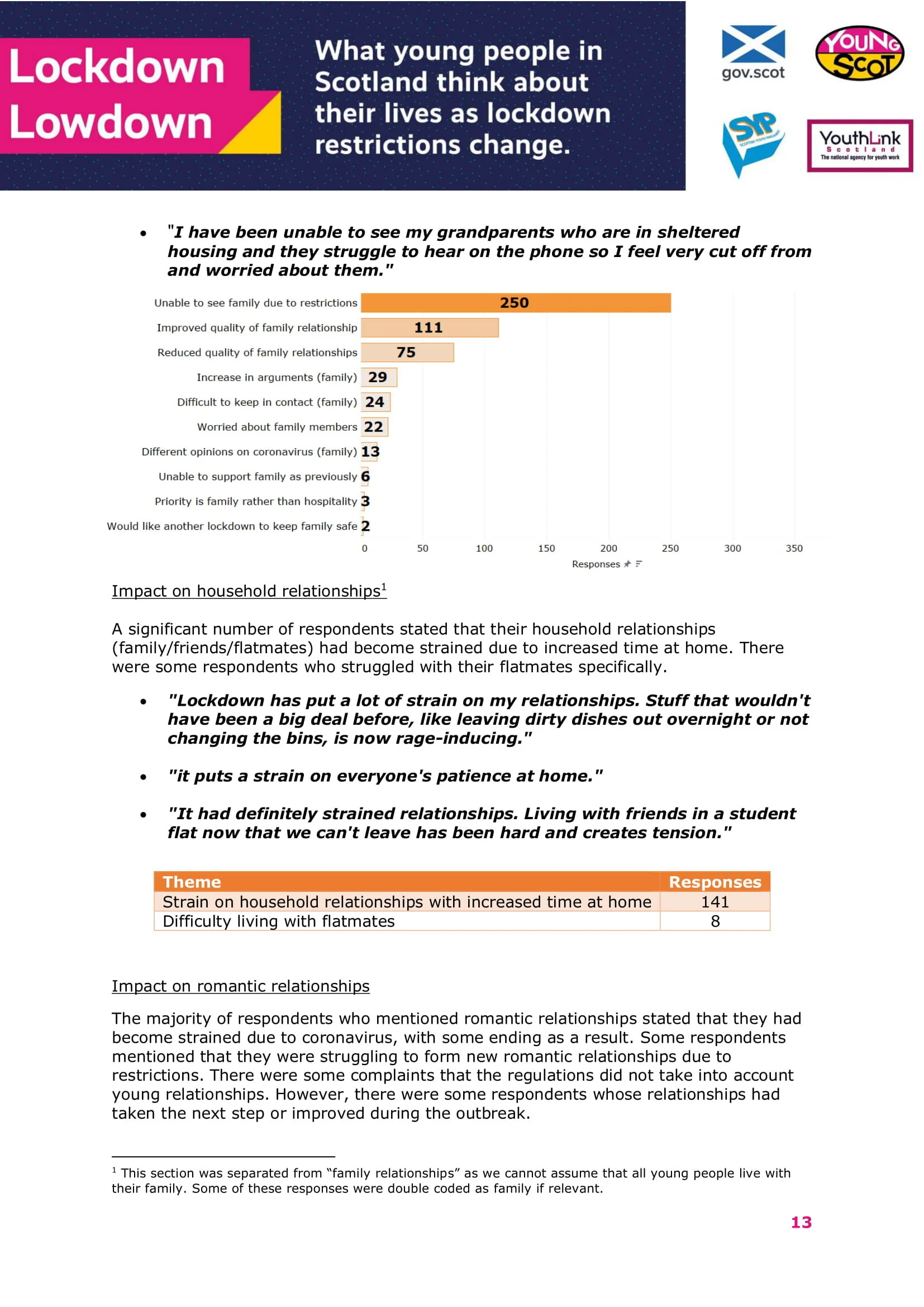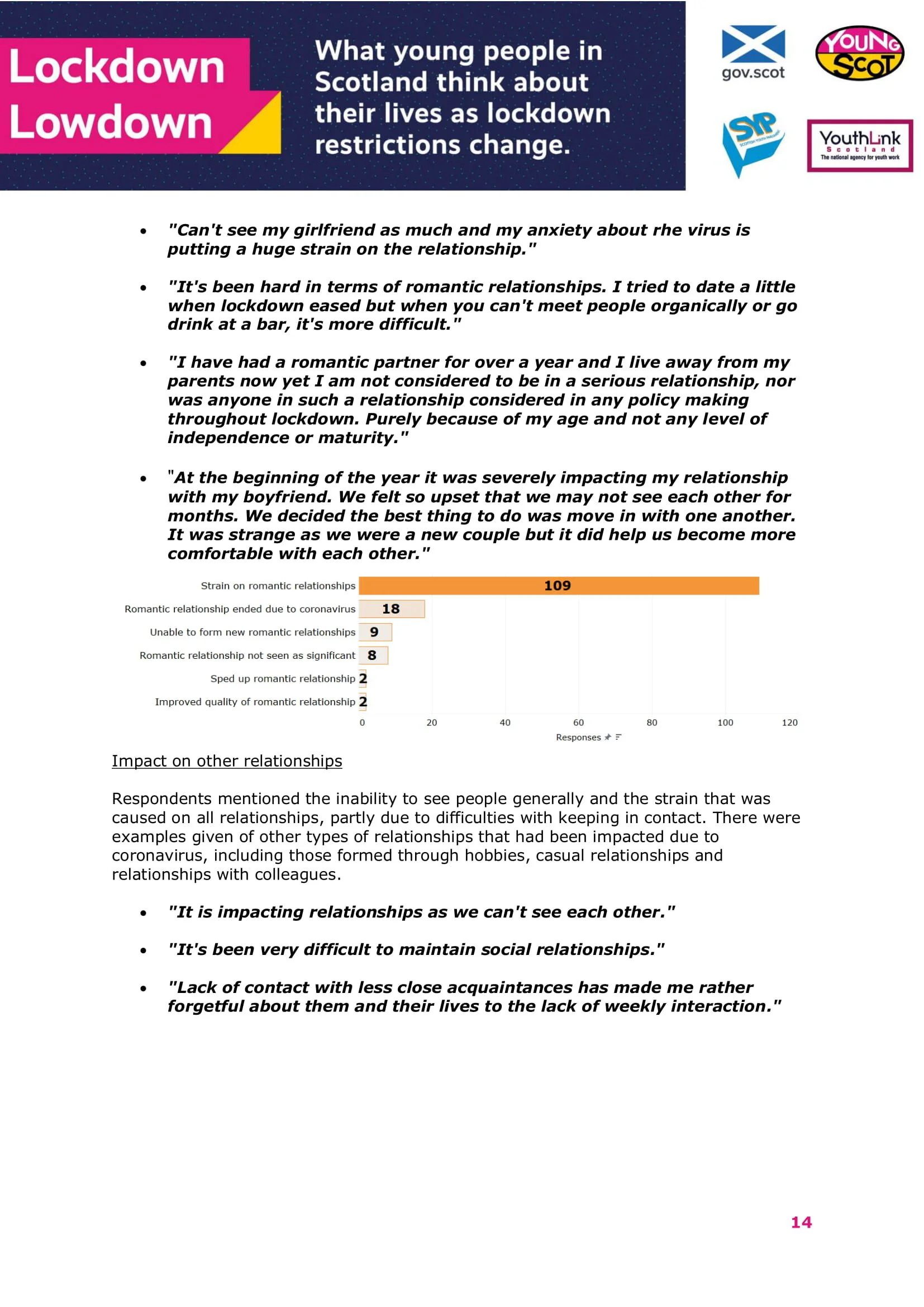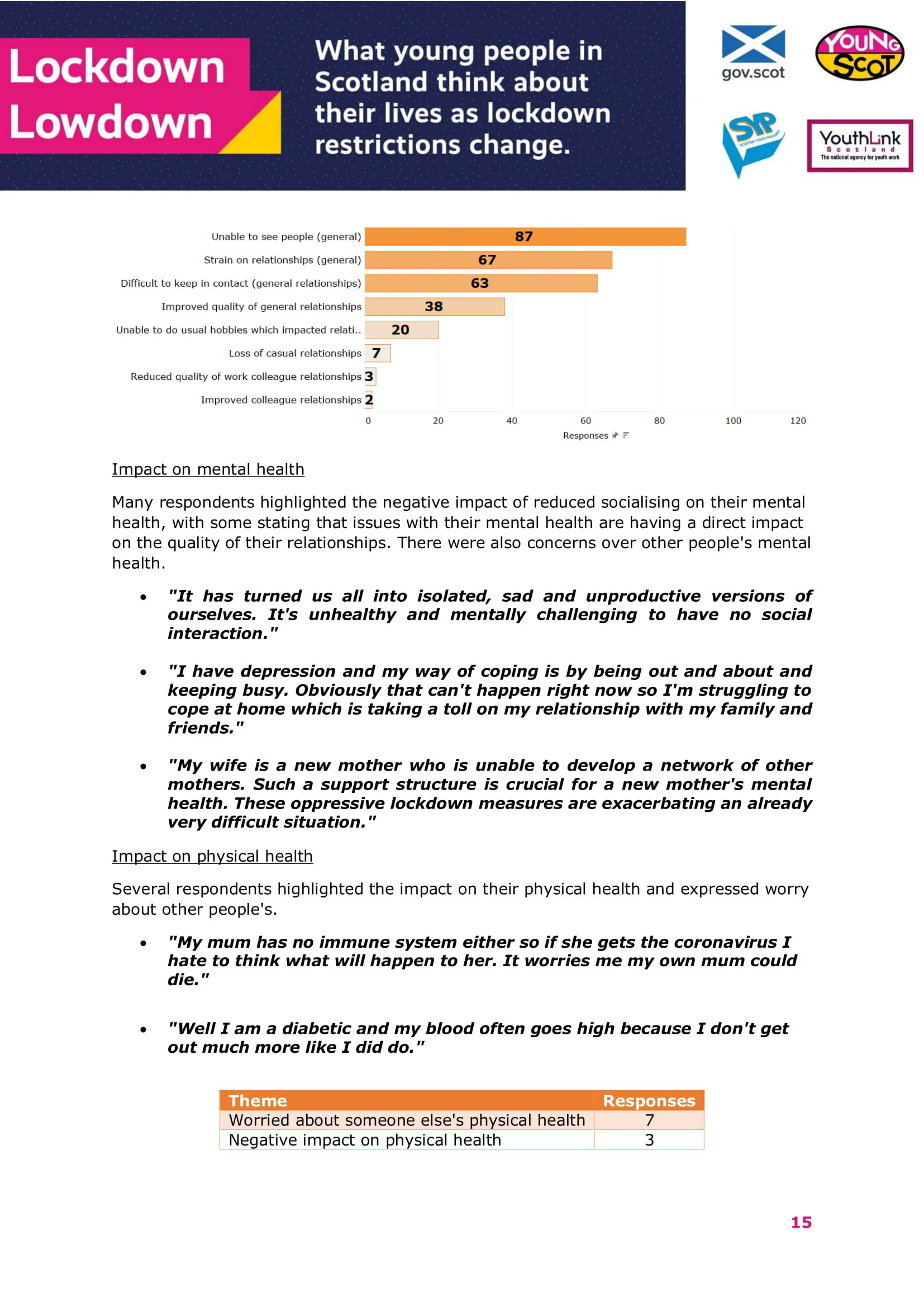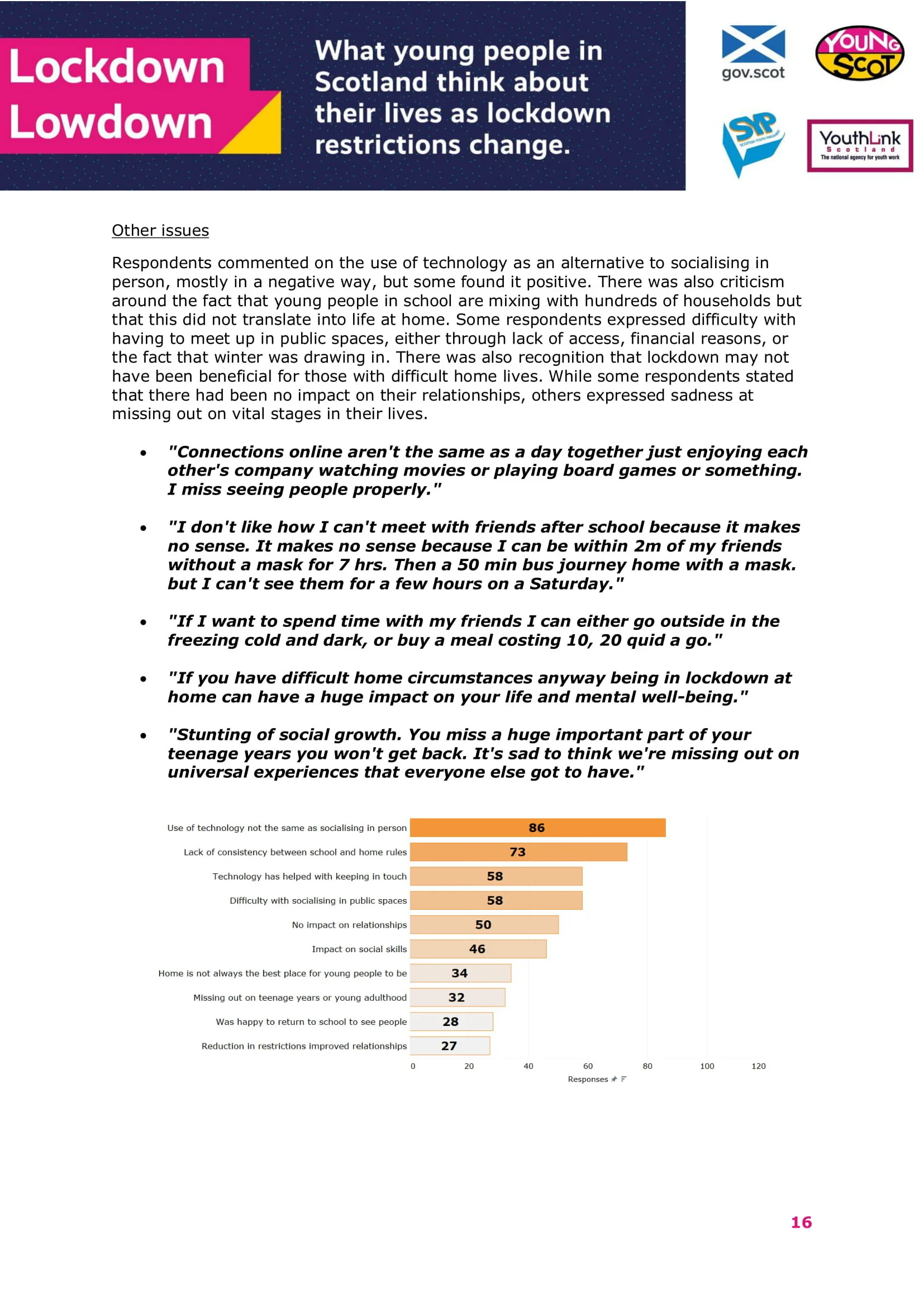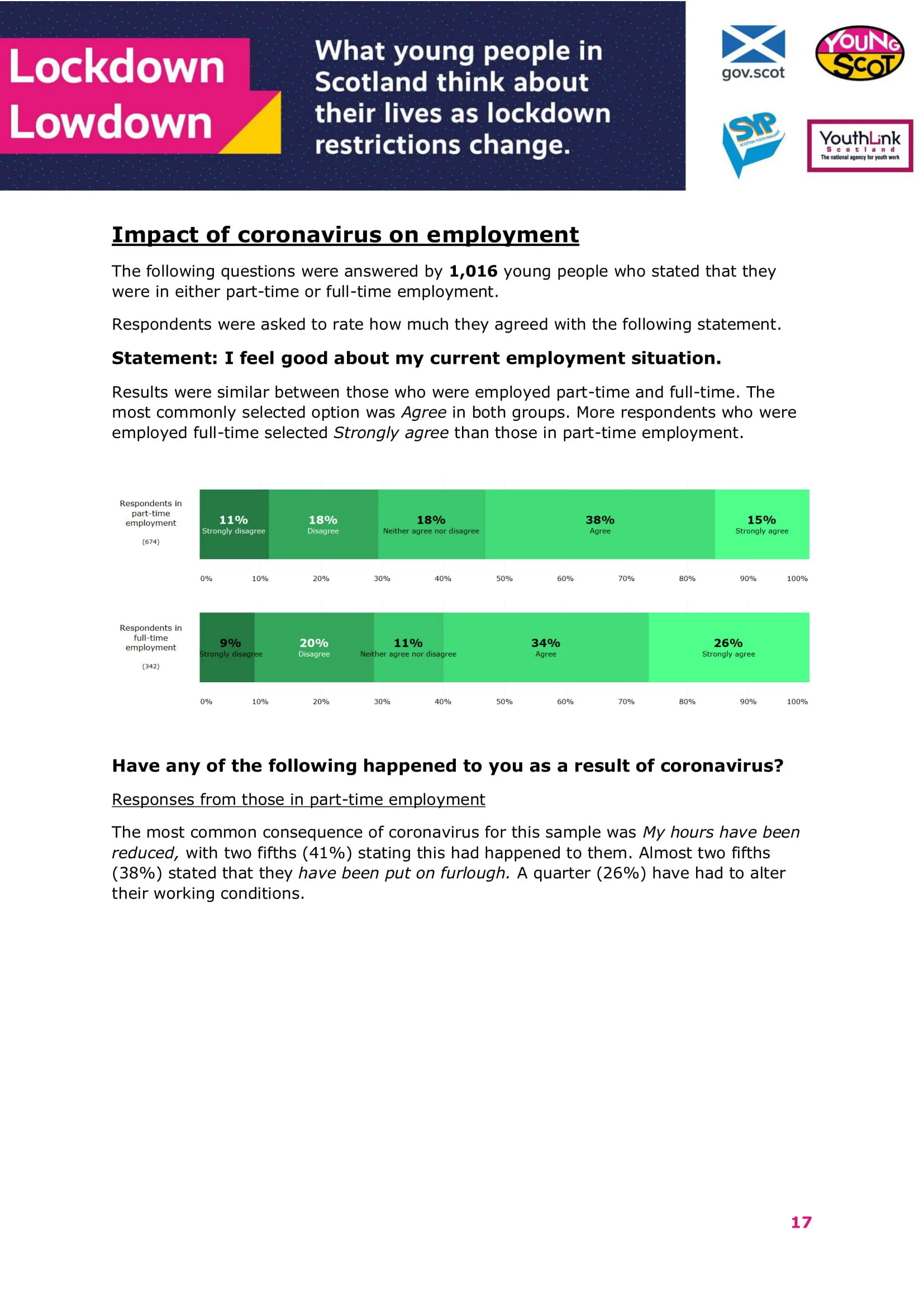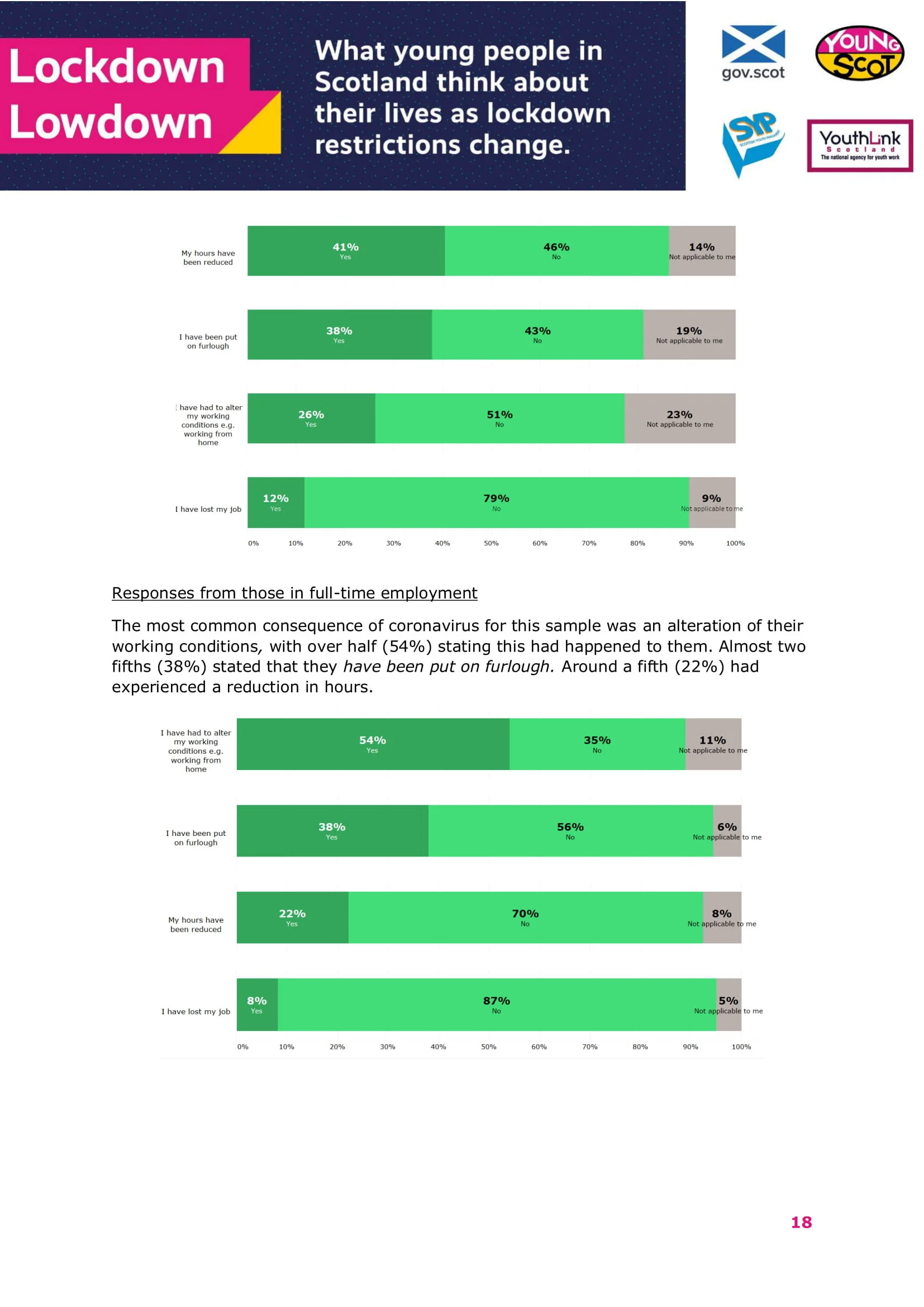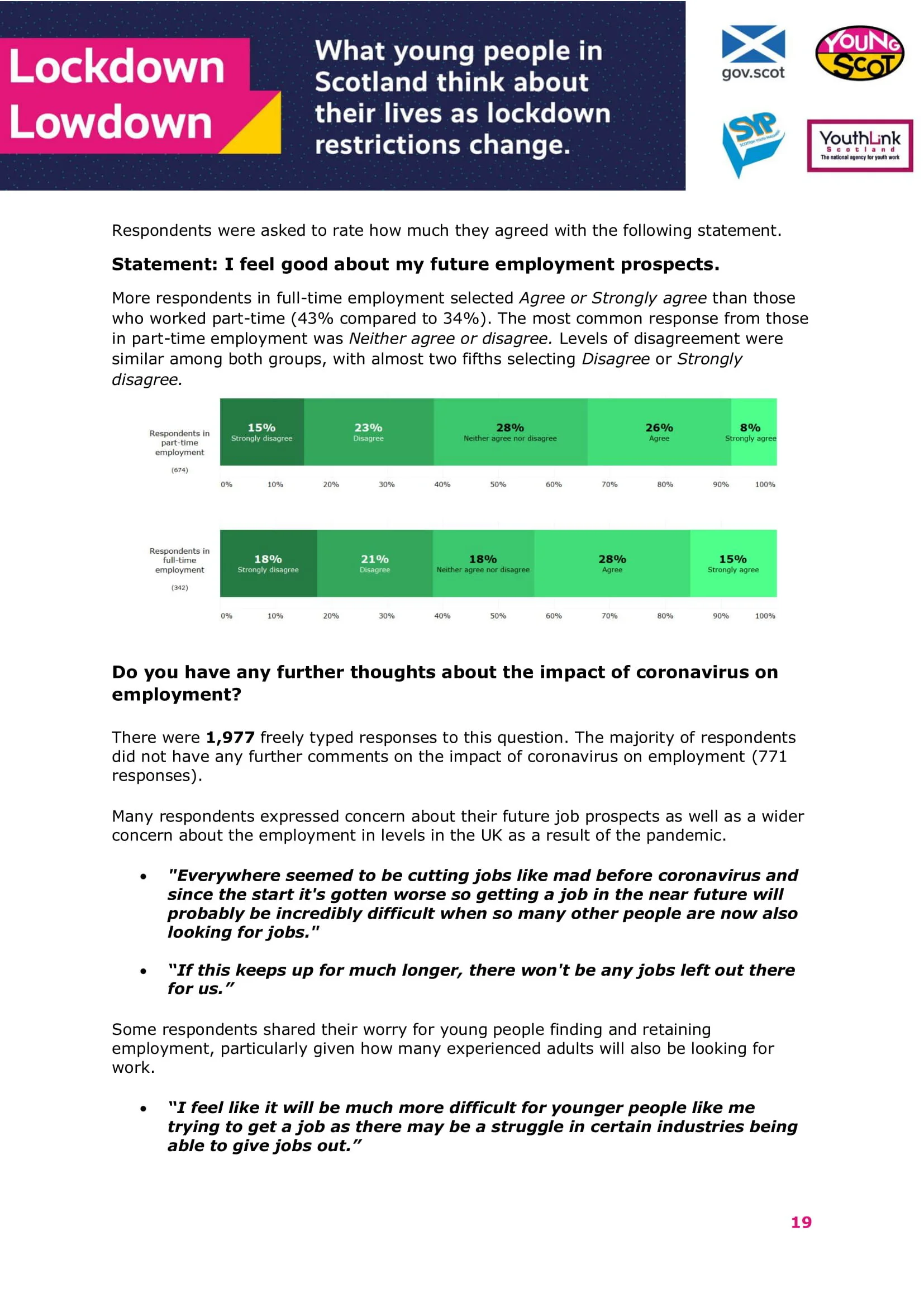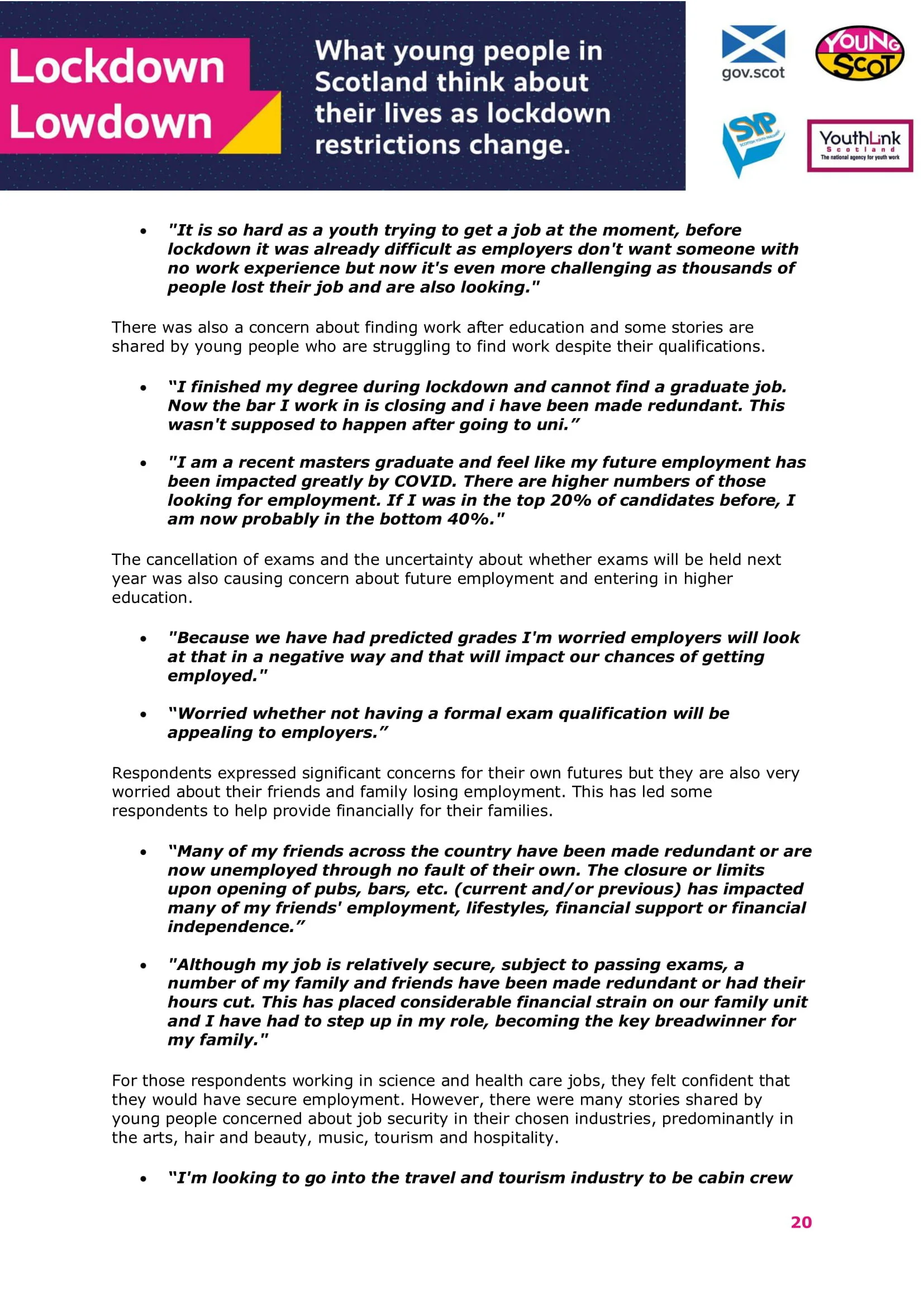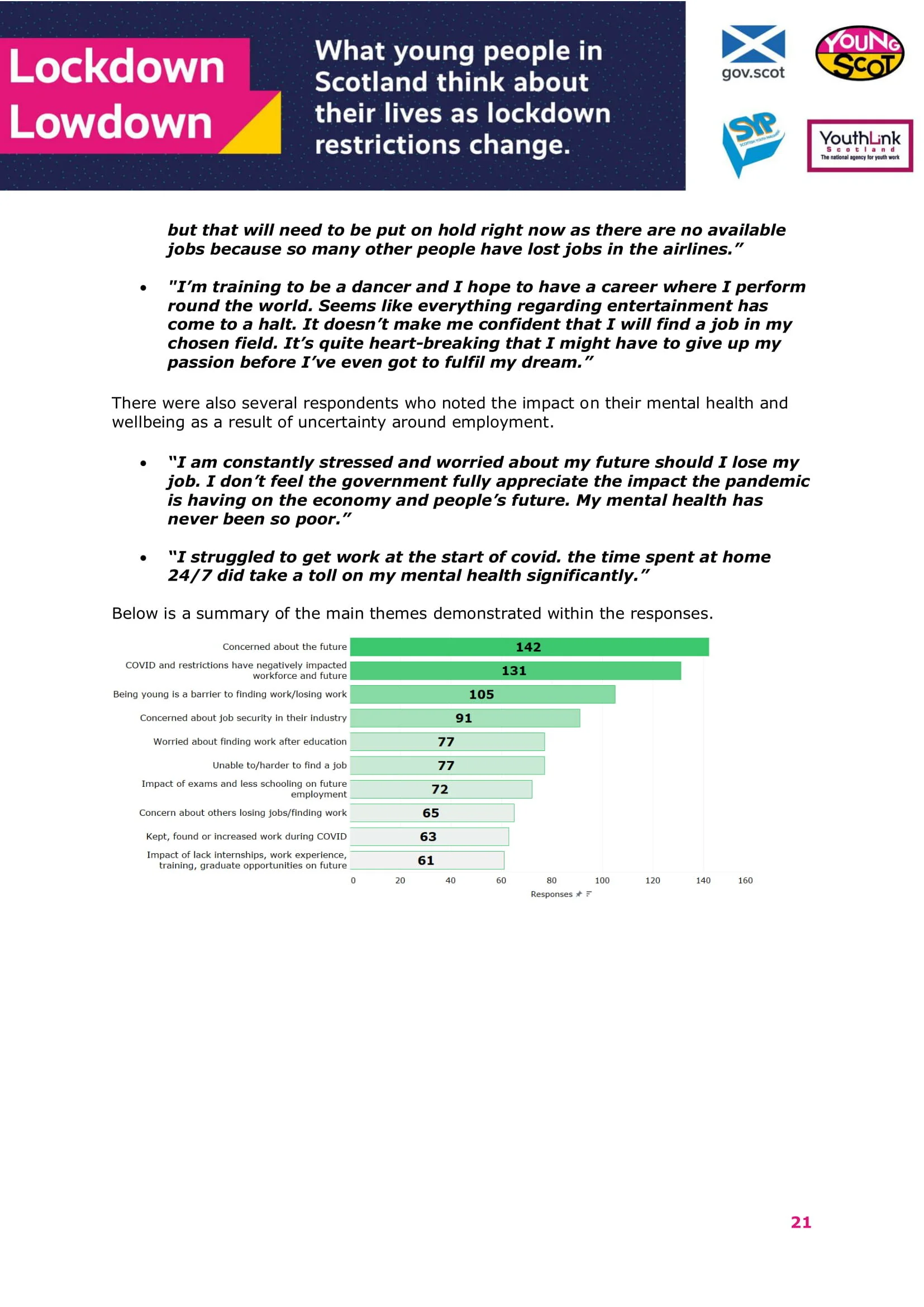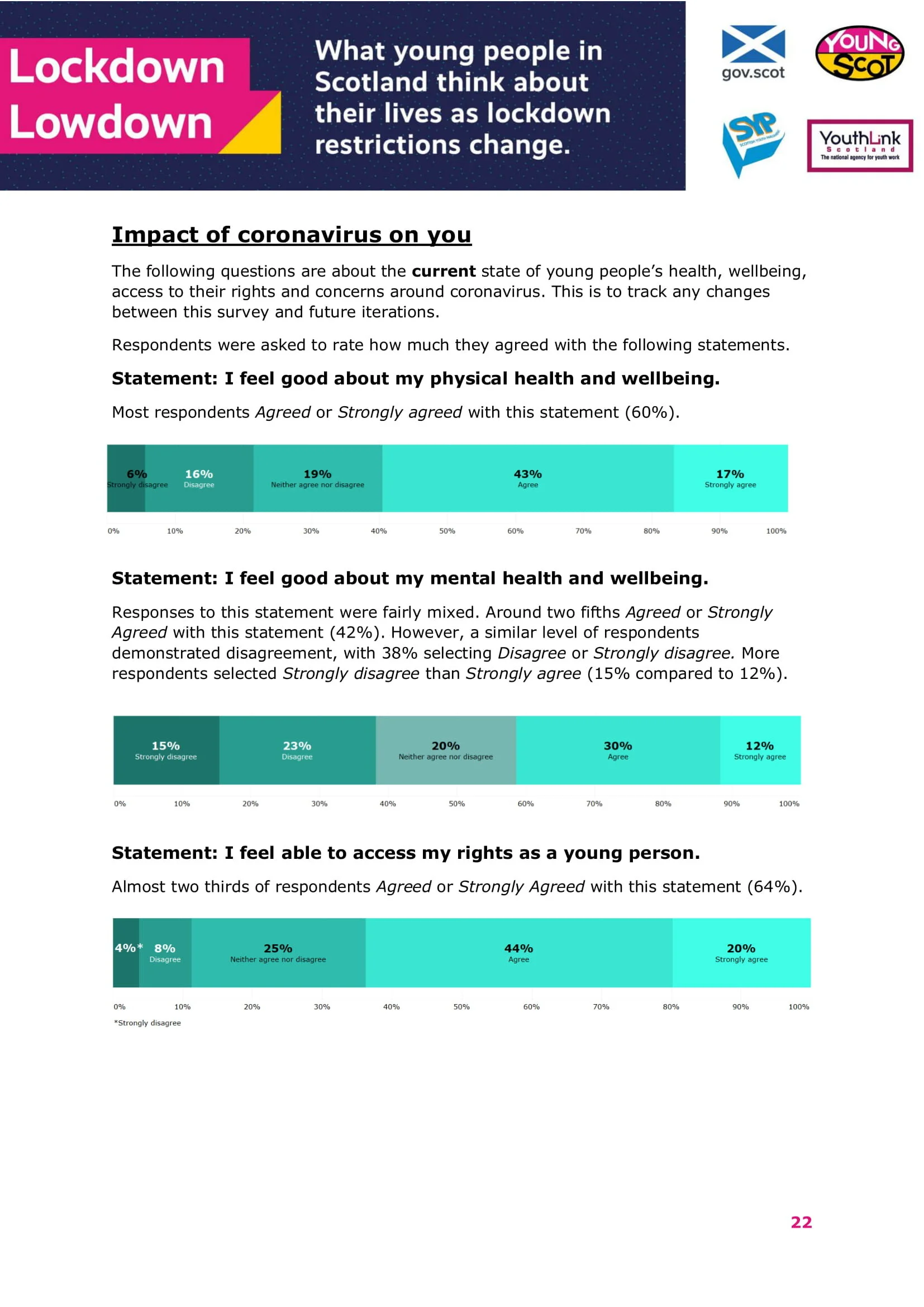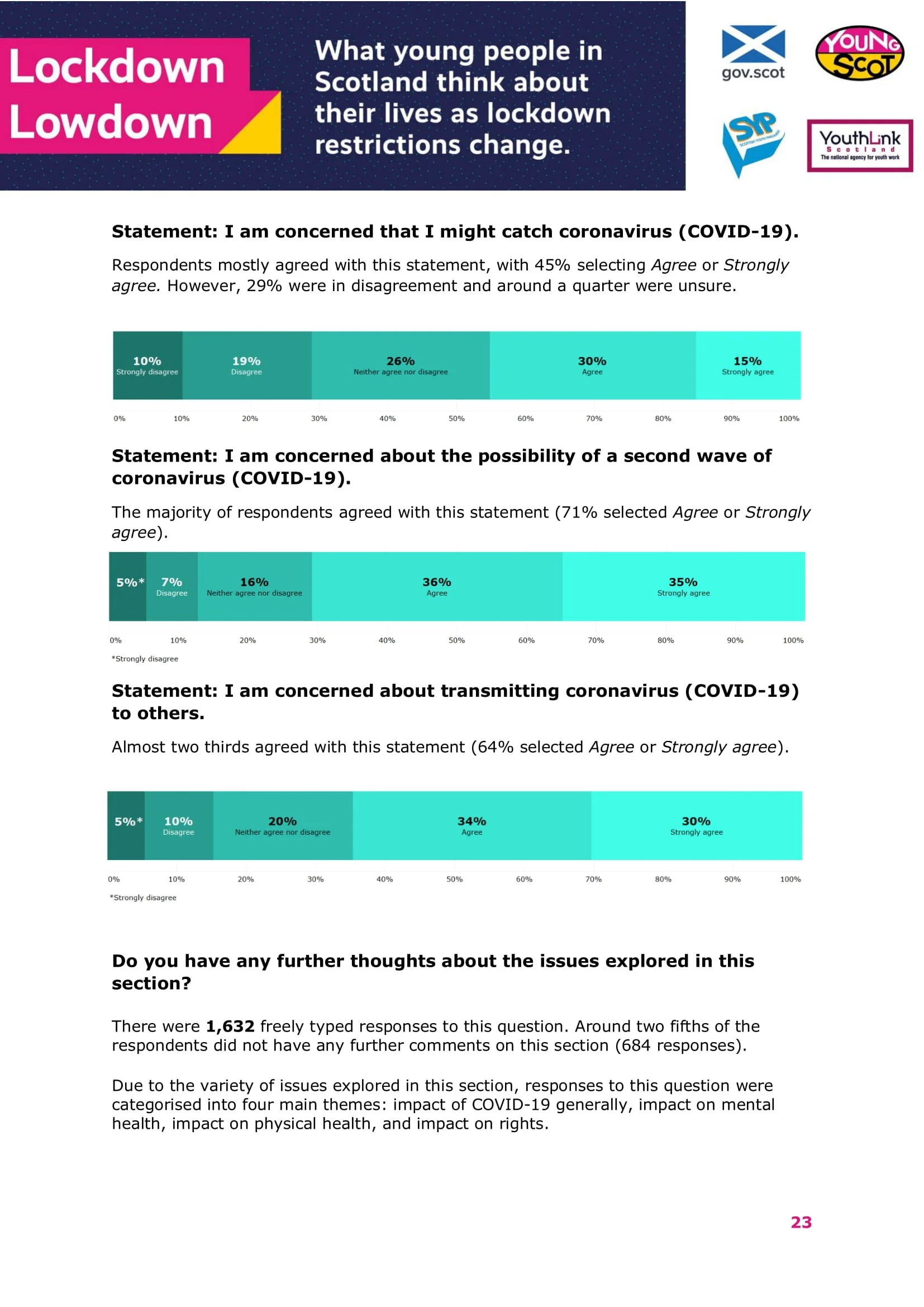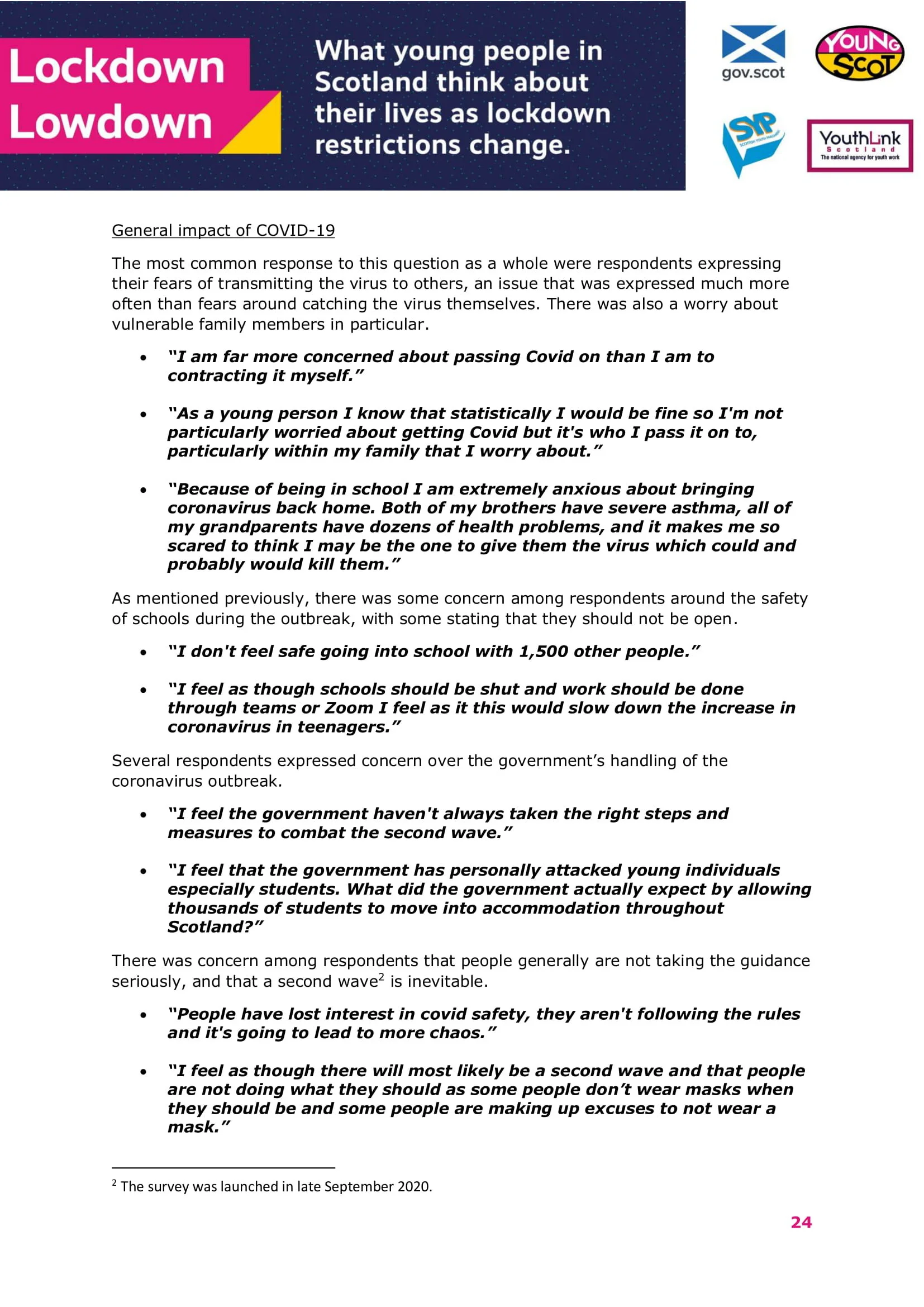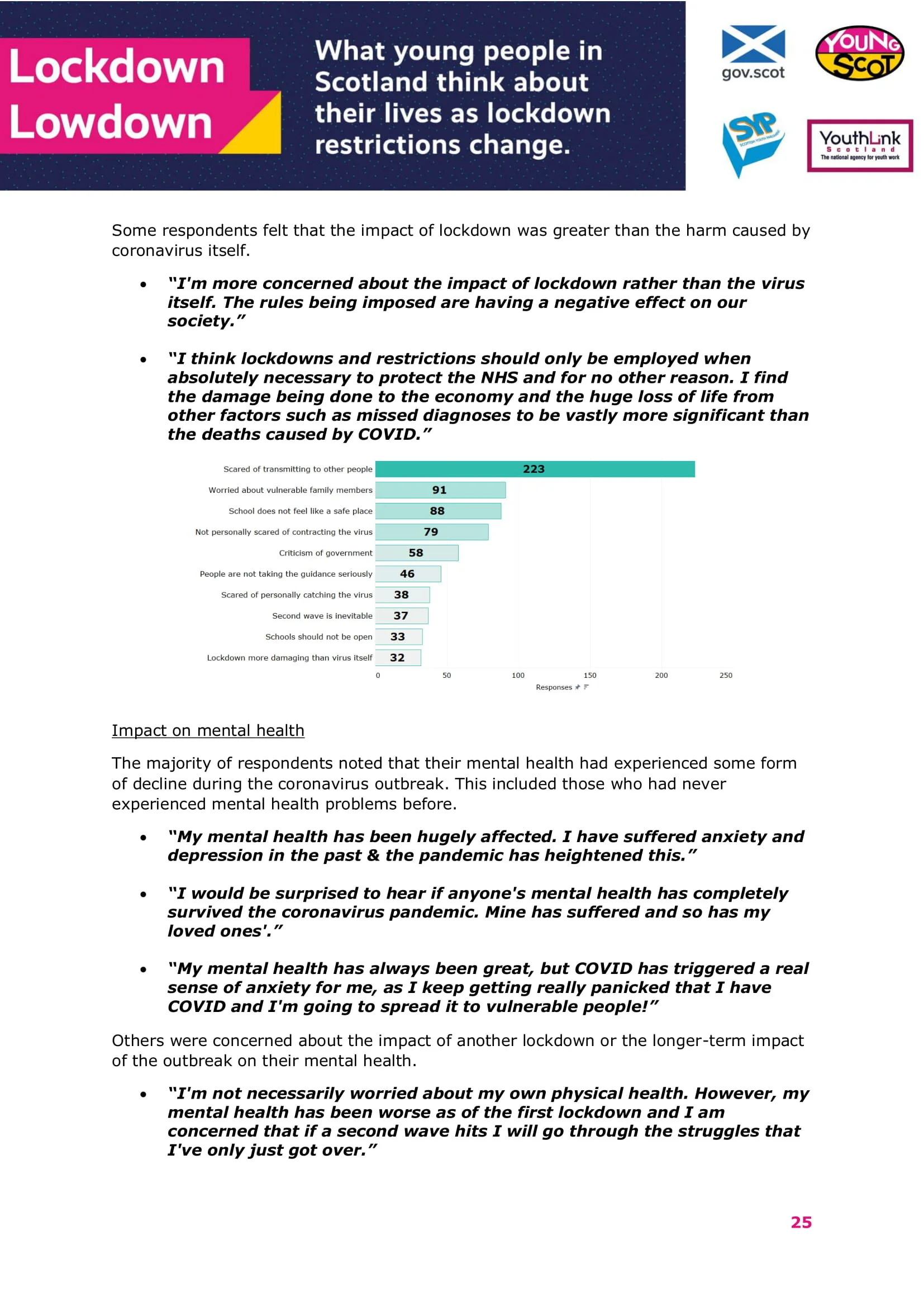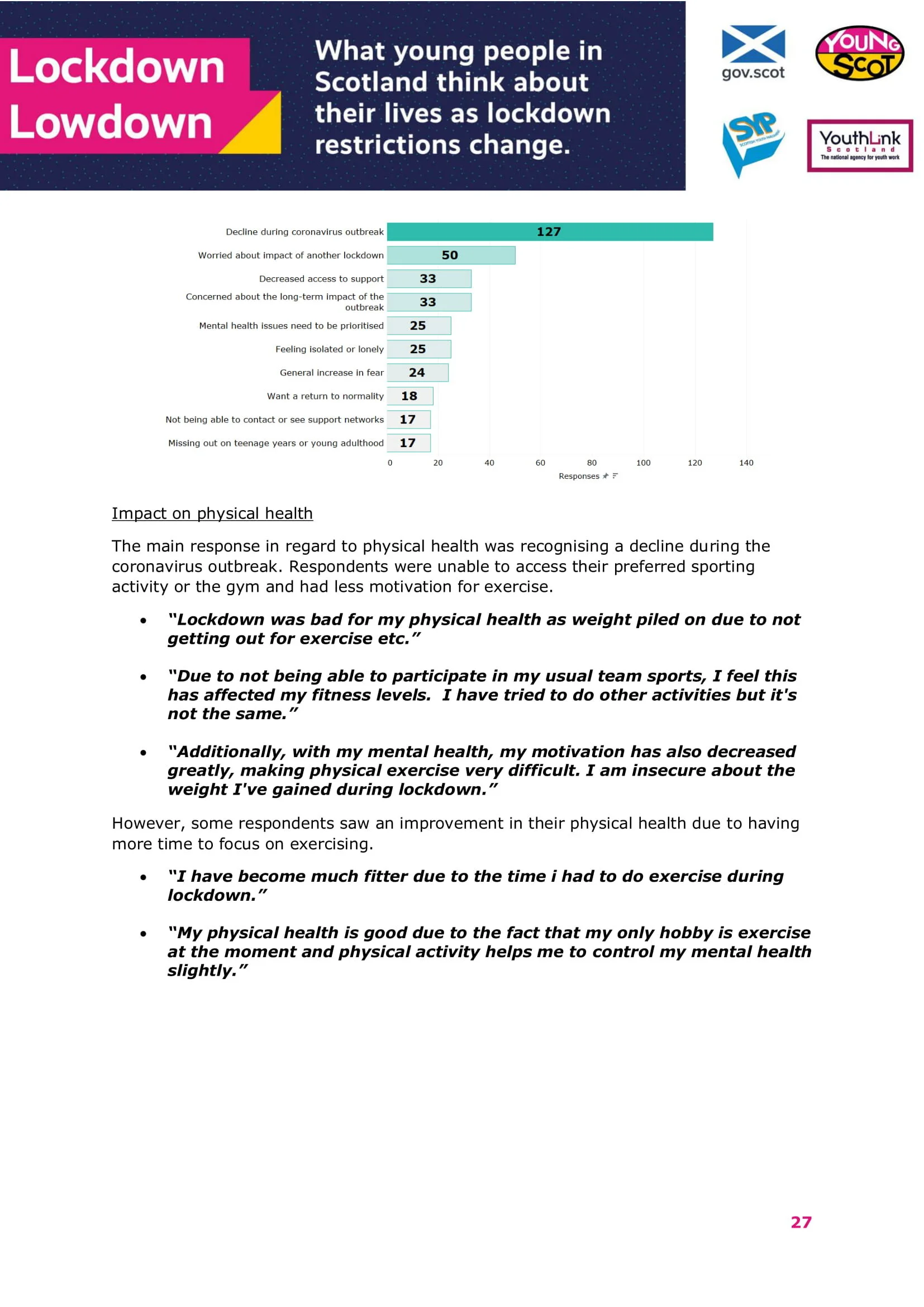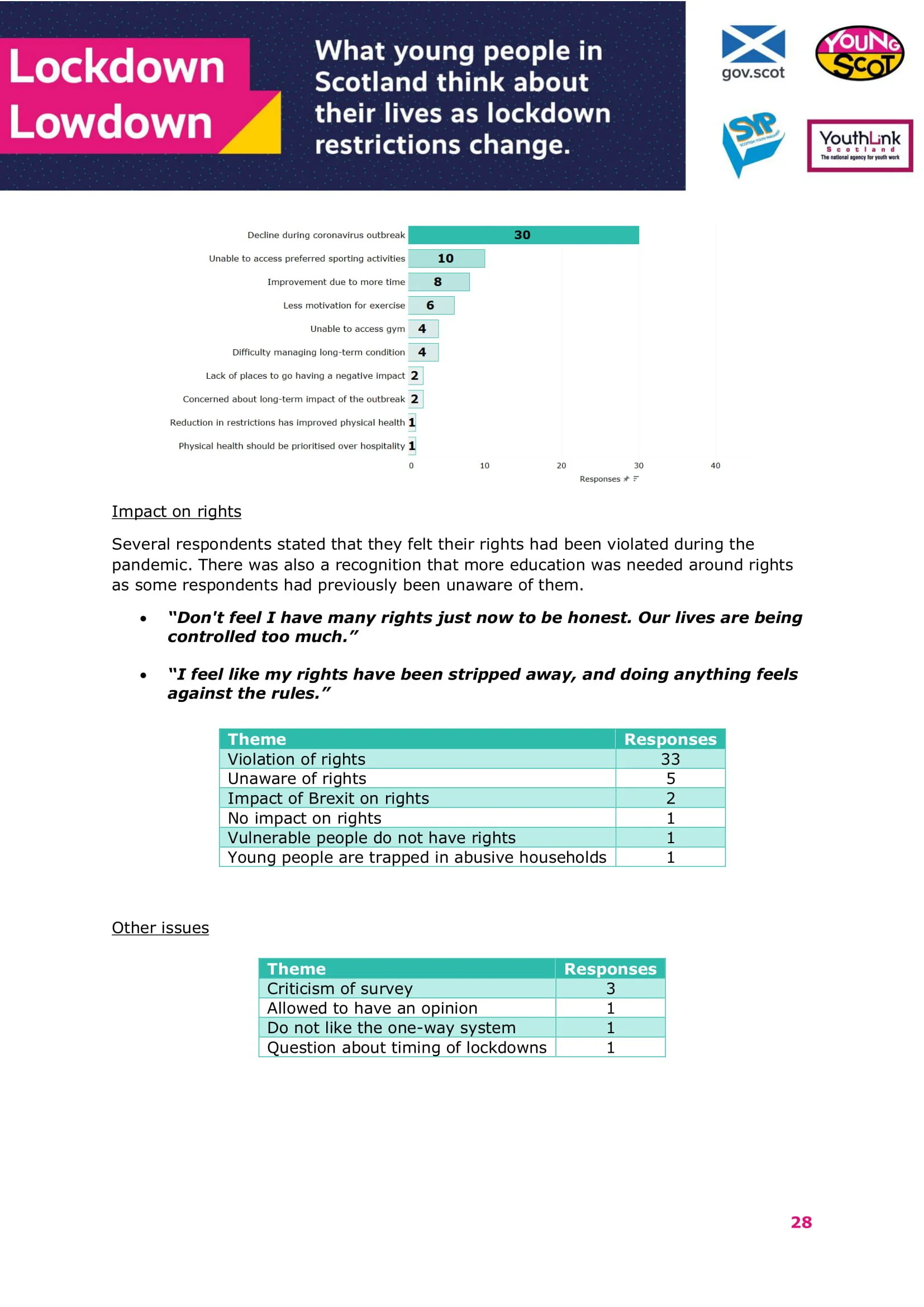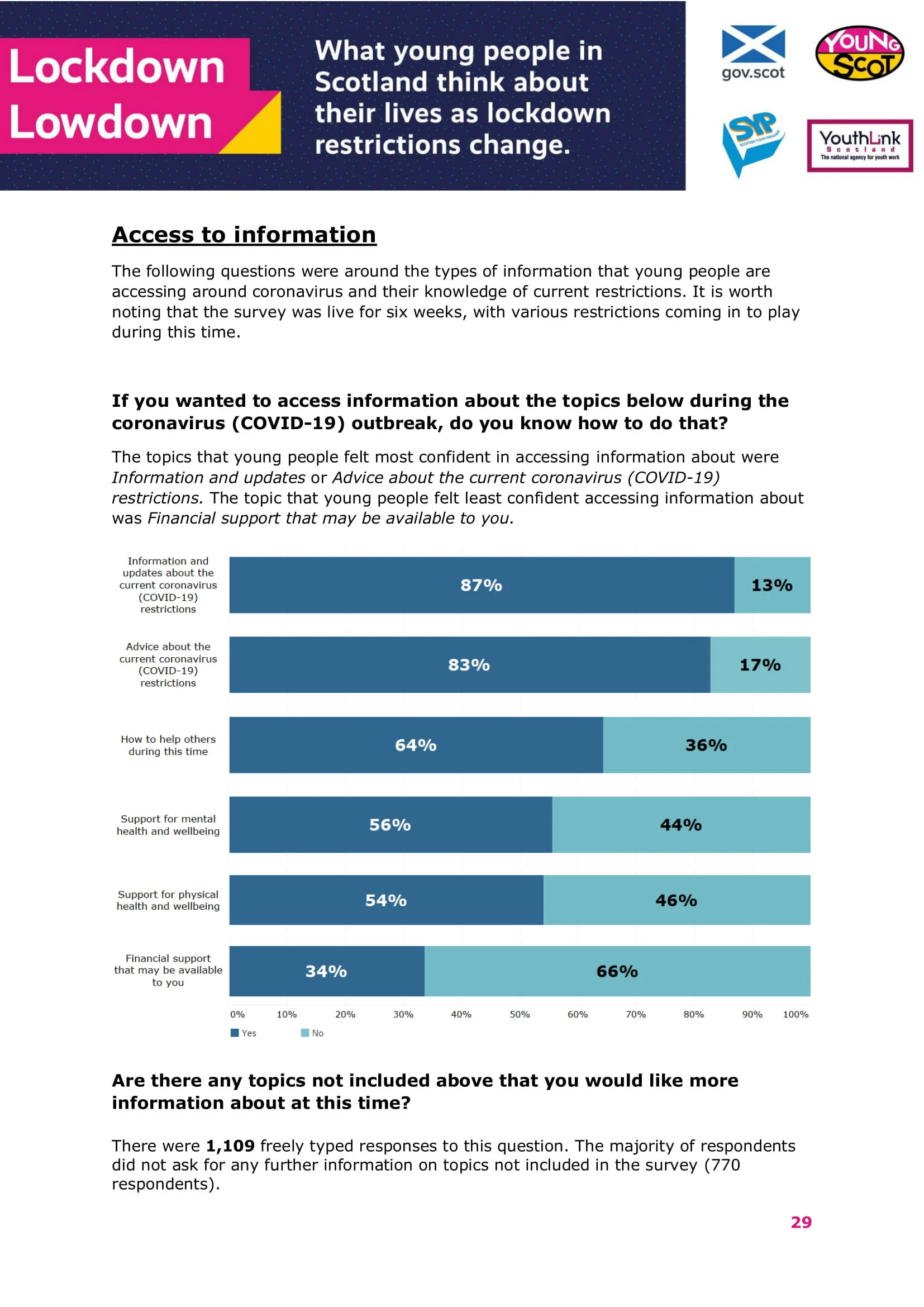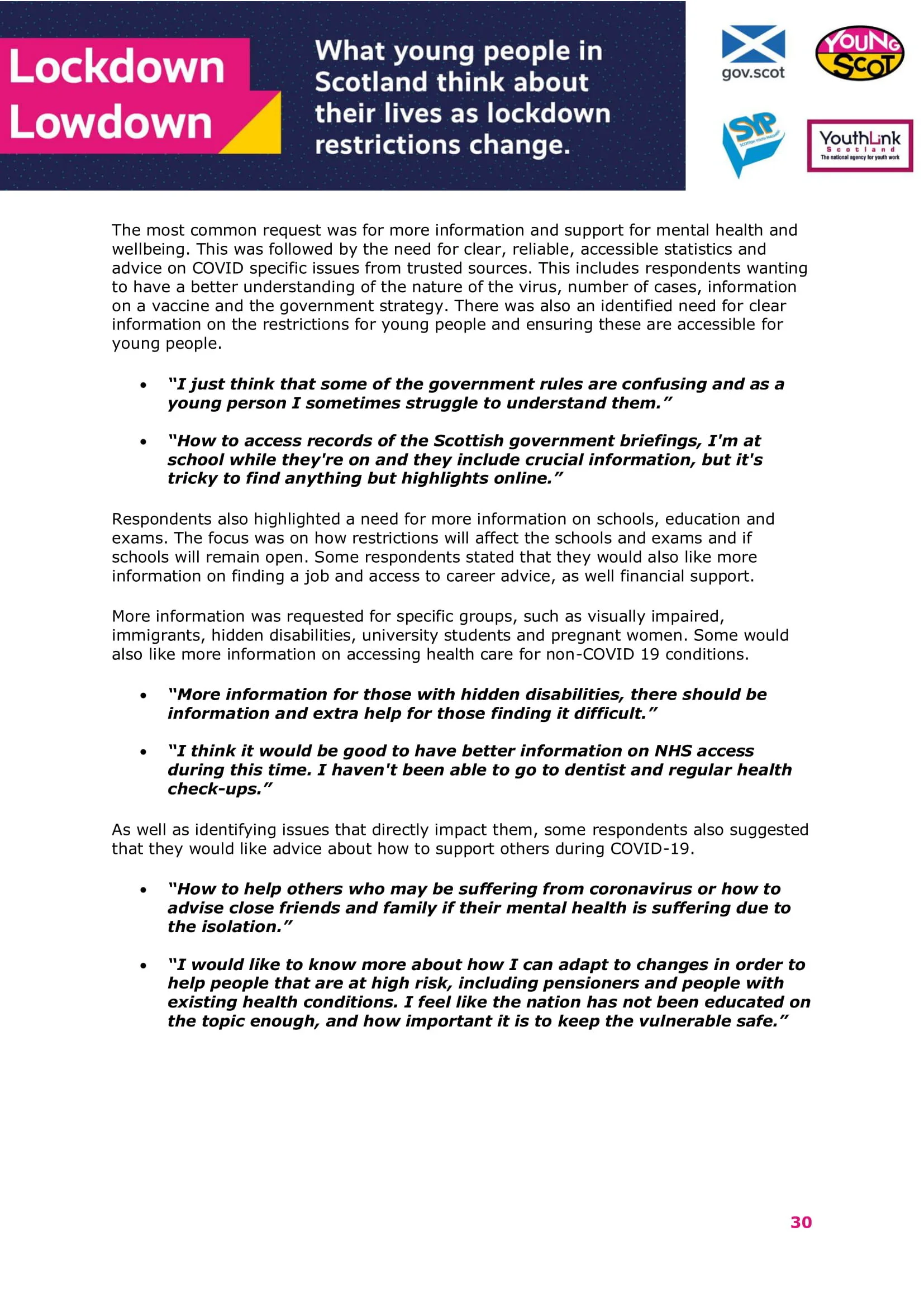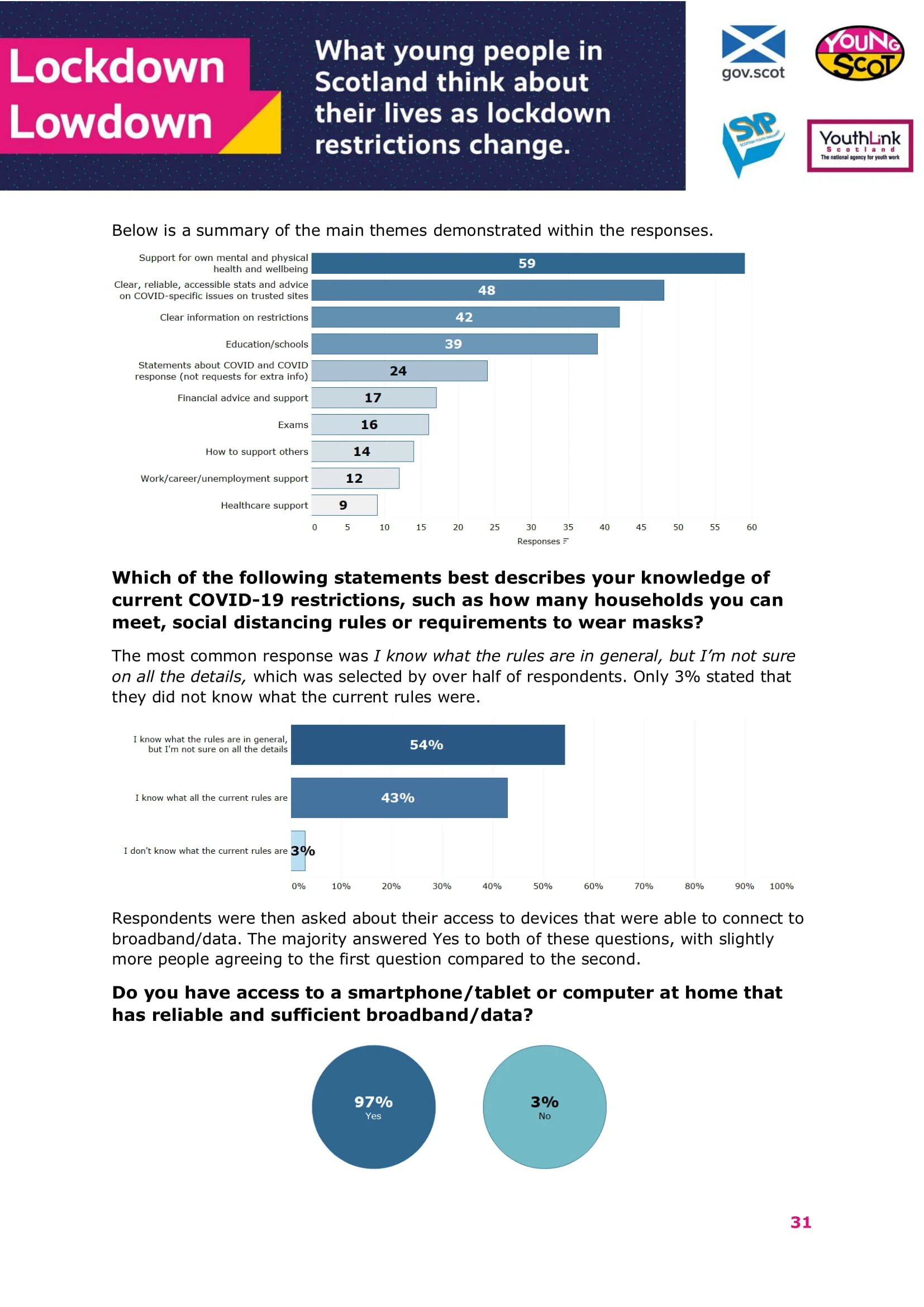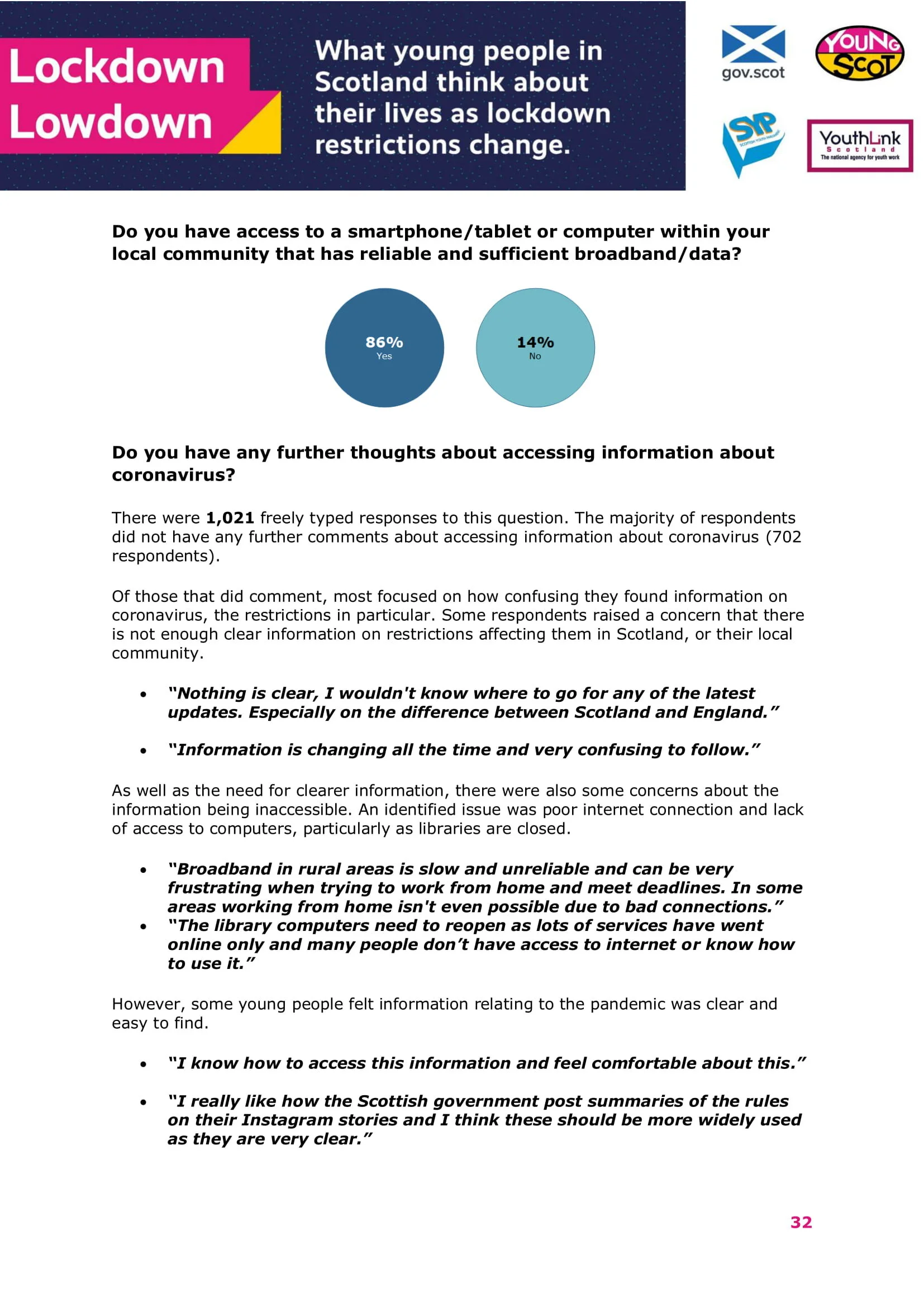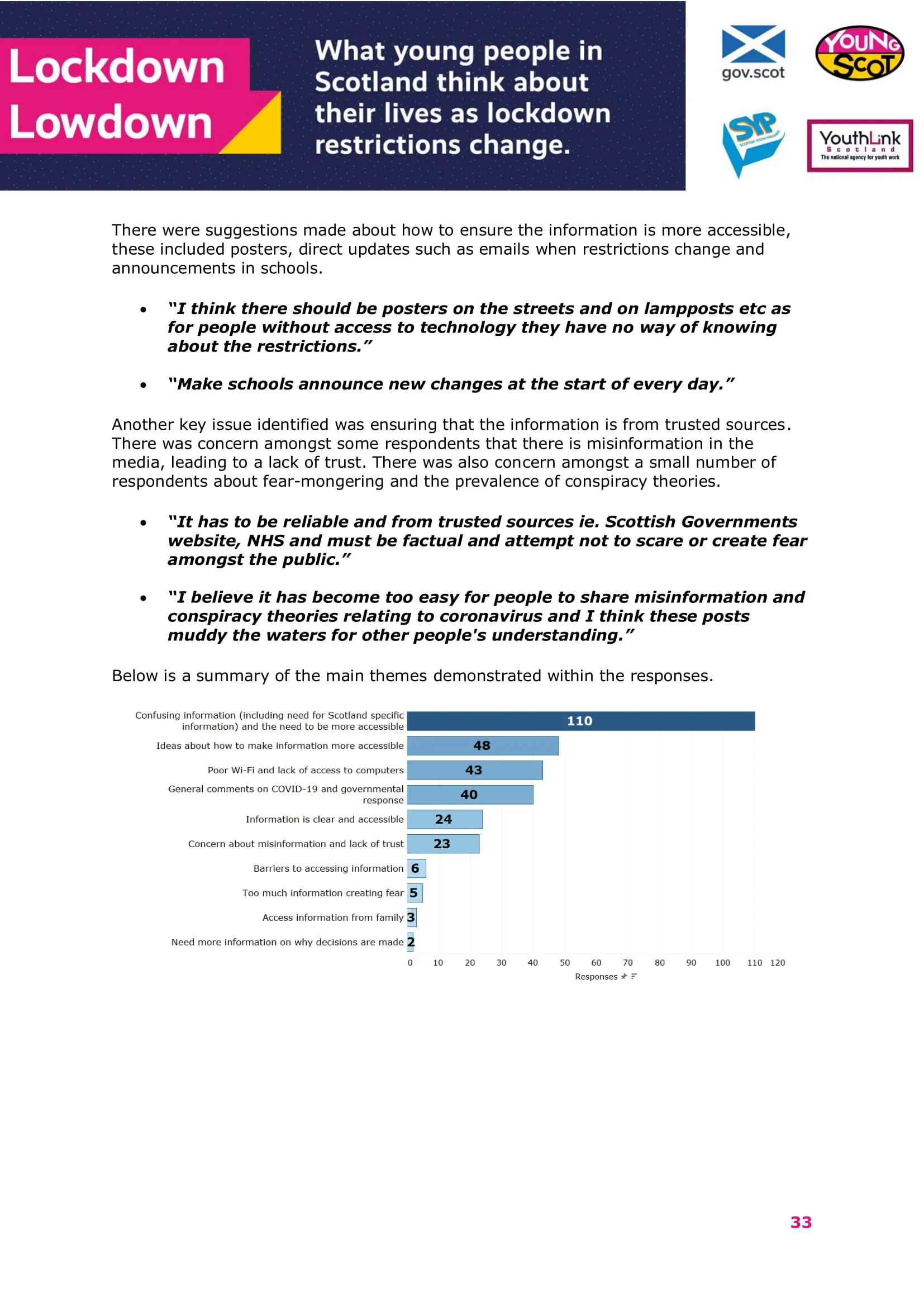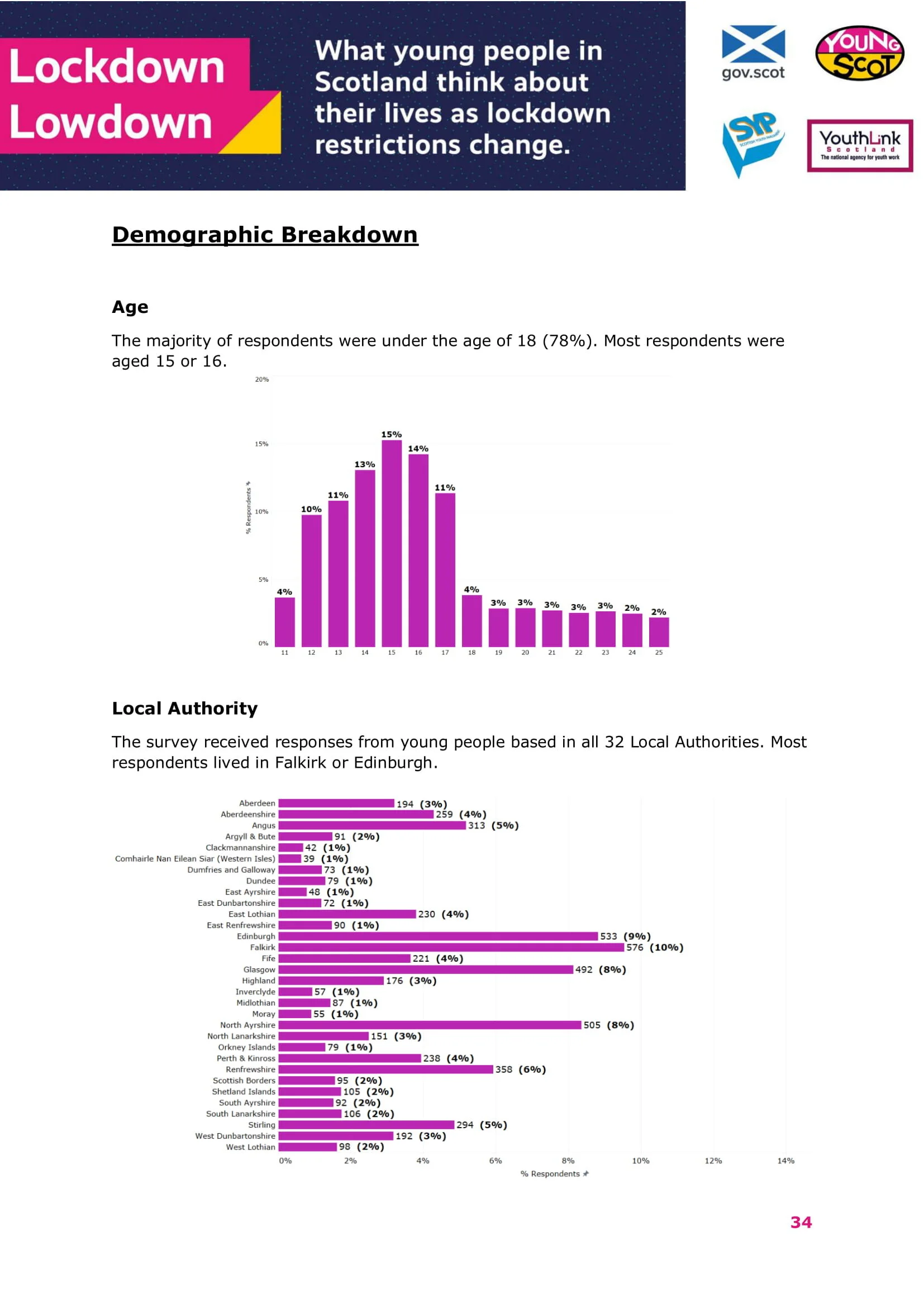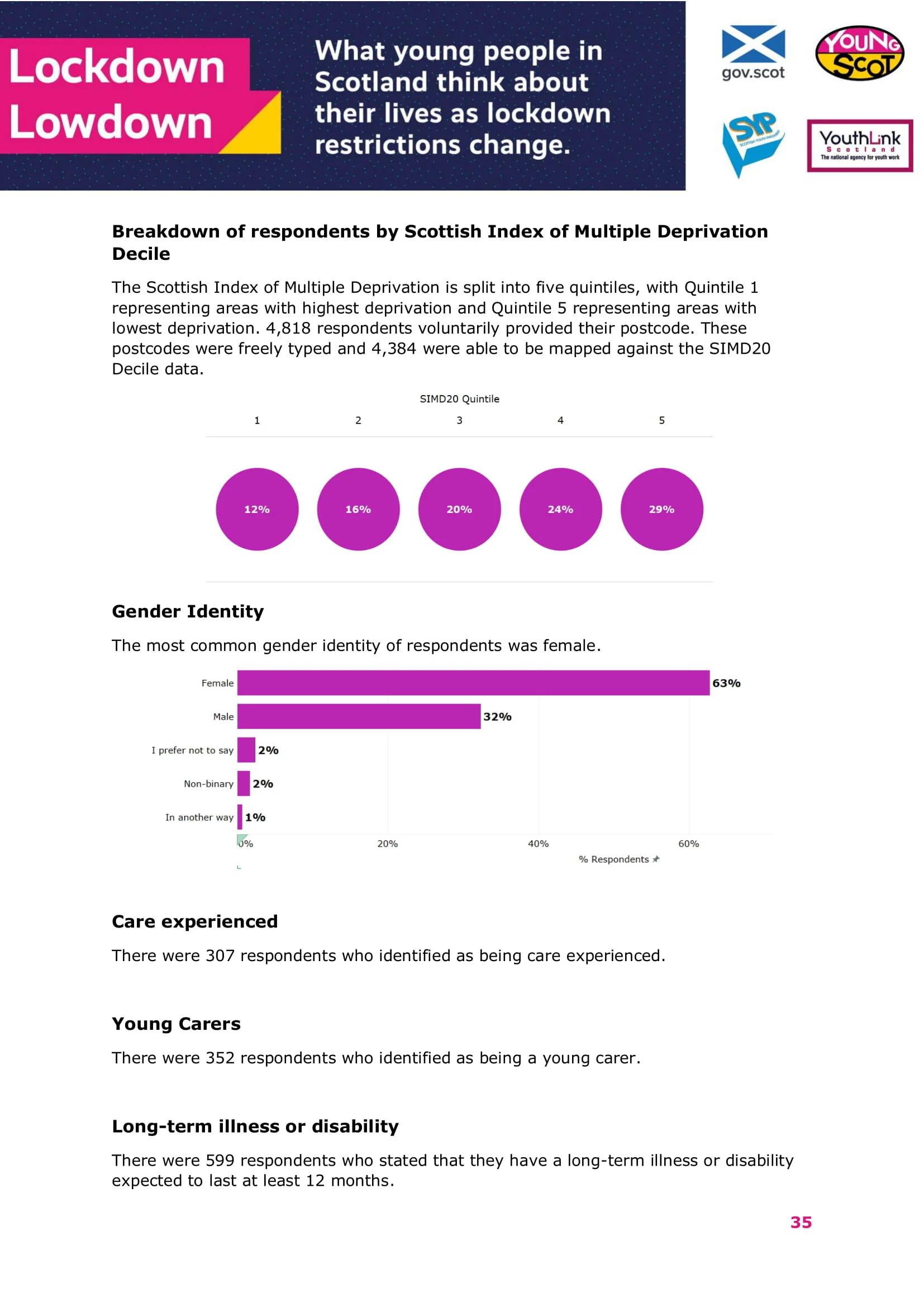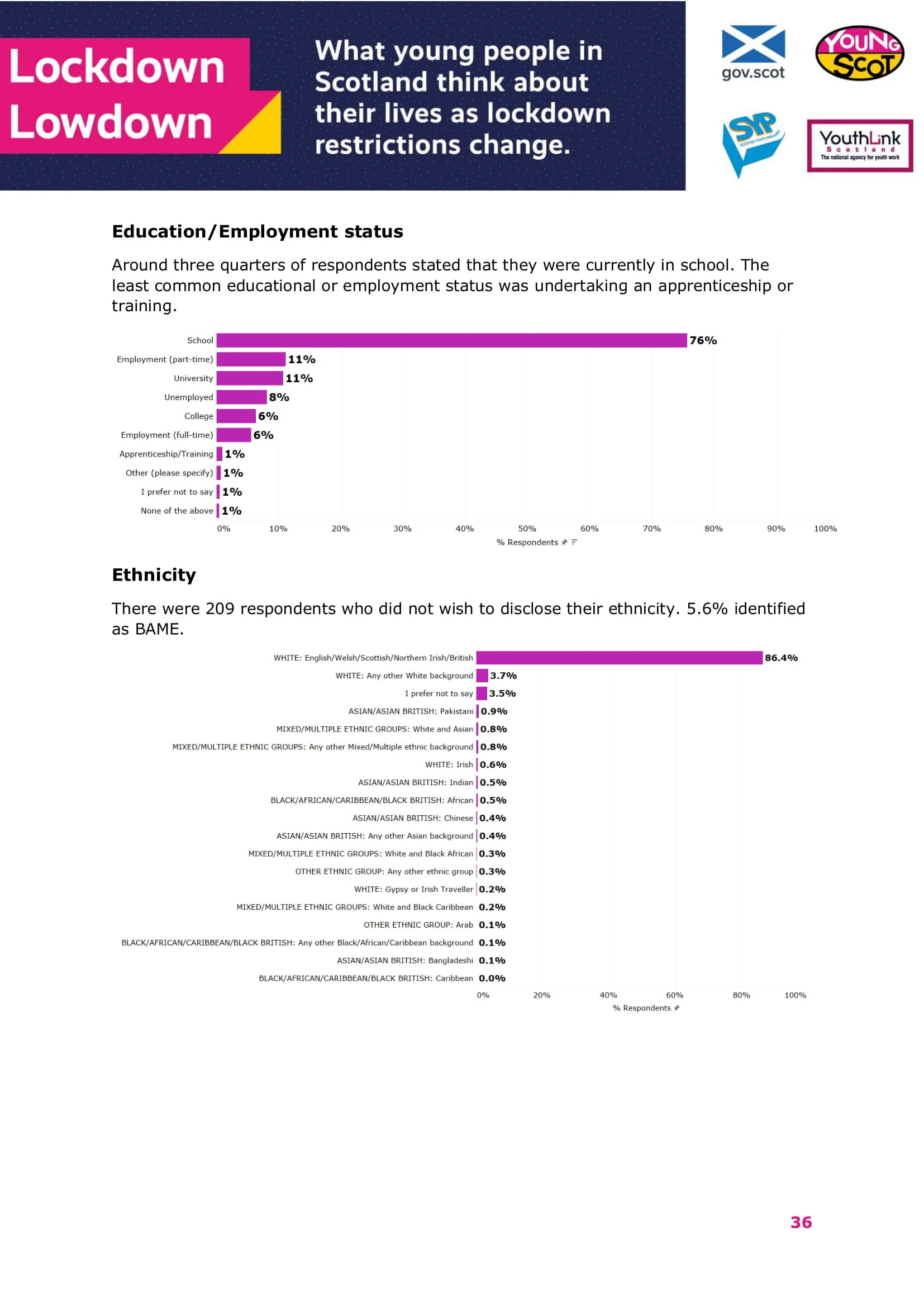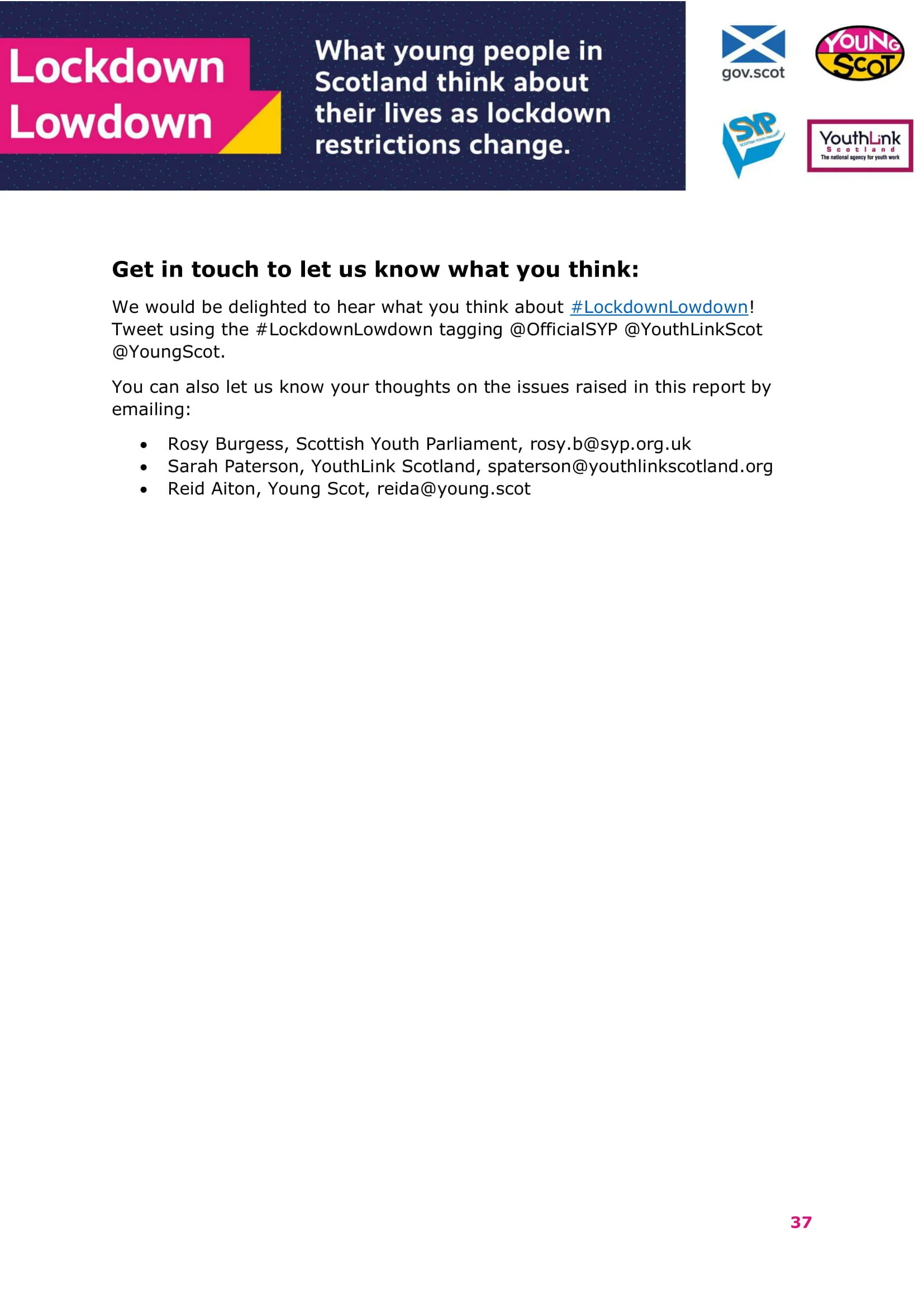Long-term impacts of COVID-19 on young people in Scotland
Our new LockdownLowdown research into the long-term impacts of the COVID-19 on Scotland’s young people suggests that nearly two in five do not feel optimistic about their future employment prospects. It also shows that 41% of those in part-time employment have seen their contracted hours reduced as a result of the pandemic.
Commissioned by the Scottish Government and delivered in partnership with the Scottish Youth Parliament, YouthLink Scotland and Young Scot, the study of over 6,000 young people serves as a follow-up to research conducted earlier in the year that explored young people’s immediate concerns in response to COVID-19.
Alongside the survey, the Scottish Youth Parliament ran focus groups with young people whose voices are seldom heard – to identify if the pandemic has impacted pre-existing inequalities.
Nearly nine months on, the new LockdownLowdown research shows:
Employment and finances are a leading concern among young people – with more than a third of those in employment placed on furlough.
Access to information continues to be an issue, with two-thirds of respondents admitting to not knowing how to access information on financial support and two in five still aren’t confident about accessing information on mental health and wellbeing.
Two in five young people are worried about their mental health – an improvement compared to April.
Following the reopening of schools and learning environments, over three-quarters of young people have returned to in-person education – with more than two thirds happy to be back. However, respondents admitted they would like more information on the future of schools and exam procedures.
The focus group research with young people whose voices are often unheard, includes interviews with disabled young people, young people from ethnic minority backgrounds, care experienced young people, young people in the criminal justice system, and young carers.
Key findings from the focus groups:
Members of the focus groups stated that they were grateful to have spent time with their family members during lockdown, although recognising the stresses that come with living and working together in a small space – reflecting the survey findings, with over four in five of respondents claiming to have a good relationship with their family.
While young people acknowledged that technology had helped them stay in touch with friends and families – participants with disabilities noted that some of the commonly used digital platforms were not always accessible to them, increasing anxiety, stress, and feelings of isolation.
You can scroll through a preview of our report, download a full pdf version using the Download button or access a plain text version of our report below.
Plain Text Version
LockdownLowdown
What young people in Scotland think about their lives as lockdown restrictions change.
Survey of over 6,000 young people from across Scotland
November 2020
Introduction
In response to the COVID-19 pandemic, Scottish Youth Parliament, YouthLink Scotland and Young Scot partnered to find out how the pandemic was impacting young people in Scotland.
#LockdownLowdown: Survey 1
In April, the first #LockdownLowdown national survey received 2,500 responses from young people aged 11 to 26 from across Scotland. The results were shared with stakeholders who recognised the importance of hearing young people's voices during this time. More information about the survey can be accessed here.
#LockdownLowdown: Survey 2
In recognition that the impact of lockdown will be long-term, the Scottish Government commissioned a follow-on #LockdownLowdown survey that ran between 28th September and 2nd November 2020 and received 6,043 responses.
This report explores the findings of this second survey – with a focus on the concerns of young people as lockdown restrictions change.
This activity ran alongside focus groups held by the Scottish Youth Parliament with young people whose voices are seldom heard.
Notes
1. There were several open questions within the survey. Each of these questions was optional, meaning not every respondent will have contributed a response.
2. Due to a large number of responses, there were a lot of themes generated during qualitative analysis. As such, this report explores the top ten themes for each question. All qualitative themes are demonstrated within the separate Appendices document.
3. The survey included a final question regarding any "further thoughts". The majority of respondents stated that they had nothing further to say and the responses from those that did provide further comment duplicated only the insights that are represented in the results of other questions. Therefore we have not recorded those in this report.
Key Findings
Impact of coronavirus on education
1. Around three quarters (76%) of relevant respondents had returned to in-person learning. Of those that had returned, around three quarters (76%) were happy with the arrangements for their educational course, with around a quarter (24%) stating that they were not.
2. Respondents were asked if they would like anything altered about the current arrangements for their educational course. The most common suggestions were to enforce or increase safety measures, in-person or blended learning would be preferred, and suggestions for altering the structure of the school week. Respondents also mentioned that students were not receiving adequate support.
3. Over two thirds of those who had returned to in-person learning (67%) Agreed or Strongly agreed that they were happy to be back.
4. Almost two thirds of those who had returned to in-person learning (63%) Agreed or Strongly agreed that their educational establishment had re-opened in a safe way.
5. When asked if they had any further thoughts on the impact of coronavirus on education, the most common concerns were around exams, difficulty with online/distance learning and feeling that students were falling behind on their work. Respondents also mentioned a lack of support for students.
Impact of coronavirus on relationships
6. The majority of respondents (83%) Agreed or Strongly agreed that they currently have a good relationship with their family.
7. When asked if they currently had a good relationship with their friends, the majority (84%) Agreed or Strongly agreed.
8. When asked if they had any further thoughts on the impact of coronavirus on their relationships, the most common concerns were around the inability to see friends and family, recognition of the difficulties with keeping in contact and the negative impact of reduced socialising on mental health.
Impact of coronavirus on employment
9. When asked if they felt good about their current employment situation, 60% of those in full-time employment Agreed or Strongly agreed compared to 53% of those in part-time employment.
10. The most common result of coronavirus for those in part-time employment was that their hours had been reduced (41%). Almost two fifths (38%) stated that they were furloughed. A quarter (26%) have had to alter their working conditions.
11. Over half of the respondents in full-time employment had to alter their working conditions (54%). Almost two fifths (38%) stated that they were furloughed. Around a fifth (22%) had experienced a reduction in hours.
12. When asked if they felt good about their future employment prospects, those in full-time employment Agreed or Strongly agreed more than those in part-time employment (43% compared to 34%). Almost two fifths in both groups Disagreed or Strongly disagreed with this statement.
13. When asked if they had any further thoughts on the impact of coronavirus on employment, the most common concerns were around future job prospects, employment levels in the UK and competition against adults for jobs. There were also concerns regarding the link between the impact in education and future employment prospects.
Impact of coronavirus generally (including mental and physical health)
14. Most respondents Agreed or Strongly agreed that they felt good about their physical health and wellbeing (60%).
15. Respondents had mixed views of their mental health and wellbeing, with similar numbers agreeing (42%) and disagreeing (38%) that they felt good about their mental health and wellbeing. More respondents selected Strongly disagree than Strongly agree (15% compared to 12%).
16. Almost two thirds of respondents (64%) felt that they had access to their rights as a young person.
17. In terms of catching coronavirus, 45% Agreed or Strongly agreed that they were concerned about this, with 29% disagreeing.
18. The majority of respondents were concerned about a second wave of coronavirus (71% selected Agree or Strongly agree).
19. Almost two thirds (64%) of respondents were concerned about transmitting coronavirus to others.
20. When asked if they had any further thoughts on these issues the most common concerns were fears around transmitting coronavirus to others, decline of their mental health during the coronavirus outbreak and worries about vulnerable family members.
Access to information
21. The topics that young people felt most confident in accessing information about were Information and updates or Advice about the current coronavirus (COVID-19) restrictions. The topic that young people felt least confident accessing information about was Financial support that may be available to you.
22. When asked if there were any topics that respondents would like more information about, the most common requests were information and support for mental health and wellbeing, clear reliable and accessible statistics about the virus itself and information on schools, education and exams.
23. Respondents were asked about their knowledge of the current coronavirus restrictions. The most common response was I know what the rules are in general, but I’m not sure on all the details (54%). Only 3% stated that they did not know what the current rules were.
24. The majority of respondents stated that they have access to a device with reliable broadband or data (97%). Slightly less stated that their community has access to a device with reliable broadband or data (86%).
25. When asked if they had any further thoughts around accessing information about coronavirus, the most common themes were confusion around restrictions, inaccessibility of information and ensuring that the information is from trusted sources.
Impact of coronavirus on education
The following questions were answered by 4,475 young people who stated that they were attending school, college, university or undertaking an apprenticeship/training.
Many educational or training establishments have re-opened. Which of the following best describes your current educational experience?
Around three quarters of these respondents were back to attending education in person only.
Are you happy with the current arrangements for your educational course?
Around three quarters of this sample stated that they were happy with their current educational course arrangements, with a quarter disagreeing.
Is there anything that you would like changed about the current arrangements for your educational course?
There were 2,543 freely typed responses to this question. The majority of young people did not want anything changed (1,140 responses).
Most young people highlighted that safety measures within their school needed to be enforced or increased. These measures included the use of face masks, social distancing and sanitisation practises.
· "Distancing rules are not properly in place. It is impossible to have school without distancing. I believe these rules should be enforced, especially since of the rise in cases."
· "I think there should be more social distancing measure and stricter mask and hand sanitiser rules."
In terms of preference of learning style, more respondents stated that they preferred in-person or blended learning compared to distance/online learning. However, there was a general understanding that this may not be possible in the current circumstances. There were also some respondents who asked for the online learning experience to be improved.
· "I would like more in person classes as I only have two a week but I understand the struggle to deliver them right now."
· "Less computer-based Teams learning, which we have to do at home. It would be better to do more work in class so you had the teacher's help."
· "I think the live online participation in certain sessions needs some work- often those online find it difficult to join in with class discussion."
There were some suggestions of changing the structure of the school week to allow an improved experience, such as having pupils in on different days or reducing the number of days that students were in.
· "Have some time off to do online work and then go in to do face-to-face working. Take turns for pupils to be in and be out."
Respondents stated that students needed more support, mainly from their teachers.
· "I cannot go into school like my peers, so I am essentially teaching myself the courses with little to no help. I'd love it if teachers would still put resources up on Teams or check in on me more often because I'm relying almost completely on Google."
Exams were also a major concern, with respondents asking for clarity, some wanting the dates to be moved and some calling for cancellation altogether.
· "I would like to be made more aware of what our exams/future education will be like. Myself, other students and teachers are unaware of what will be needed for exam evidence (I'm in S4 so no exams), knowing not much is stressful."
Below is a summary of the main themes demonstrated within the responses.
Those who had returned to in-person learning (both solely and in conjunction with distance learning) were asked how much they agreed with the next two statements (4,050 young people).
Statement: I am happy to be back to in-person learning.
Over two thirds of those who had returned to in-person learning (67%) Agreed or Strongly agreed that they were happy to be back.
Statement: My educational establishment has re-opened in a safe way.
Almost two thirds of those who had returned to in-person learning (63%) Agreed or Strongly agreed with this statement.
Do you have any further thoughts about the impact of coronavirus on education?
There were 1,995 freely typed responses to this question. Around two-fifths of the respondents did not have any further comments on the impact of coronavirus on education (777 responses).
The most pressing concern for respondents was about the impact of coronavirus on their exams. This mainly took the form of uncertainty around exams, and requests for clarity around them going ahead. Many respondents were upset that their exams had been cancelled, and what longer term impact that may have. It was also noted by some respondents that the pressure surrounding exams was detrimental.
· "I think it has had a big impact on us, especially with exams. It has been overwhelming not knowing if the exams will be going ahead this year or not. I think everyone would just like to know what is going on and what will happen to our future because of this!"
· "It was quite disheartening to learn that exams had been cancelled after strenuously studying for so long- ultimately, causing a lot of stress."
· "Corona virus has strongly affected my future with my higher exams being cancelled last year made a huge impact on the universities that I can even apply to. This has made me anxious and upset to think that my highers, the pathway to university has gone and I had very little control over it."
· "I think coronavirus has had a huge impact on the students that are doing exams as because of covid this will be the first year I actually sit the exams and there is a lot more pressure on doing well."
A large number of respondents expressed difficulty with distance or online learning that they had undertaken in lockdown. This may have been due to the change in environment, differing abilities to access resources, or having conditions that were not conducive to learning online. There was also a recognition that it is difficult to ask questions or have meaningful discussion while learning online.
· "Coronavirus meant that a lot of learning was done at home which I find especially difficult as you have not only distractions but you can't receive one on one help."
· "Online education doesn't work here. People don't have enough resources like computers reliable wifi."
· "I have autism and anxiety and the government restrictions are stopping me from going to school and from getting any support apart from online. ... I don't like on line stuff, so I really need and want to be in school."
· "Dull presentations. No chance for any real discussion I am put into a virtual room with people I have never met with cameras off. This is just not working."
Many respondents stated that they and their peers had fallen behind in their learning due to coronavirus and were struggling to catch up.
· "I think that due to the coronavirus and having to be in lockdown for so long has had an impact on learning as it caused us to fall behind in courses and now to try and catch up everything is rushed to try and be ready to sit Prelims and Exams."
· "Many subjects are behind in the teaching of course work or are having to recap the majority of the work done during lockdown. Units are having to be rushed in order to complete courses, meaning not all pupils will have a thorough understanding."
Some respondents felt that they lacked support during the outbreak, either from their teachers, when dealing with a specific condition or for their mental health.
· "The availability to get help from teachers is so limited now. Most of my work is having to be done at home and sometimes my computer is far too slow, doesn't connect to the internet, or work at all so how am I supposed to get all my course work done ready for my exams with also limited support?"
· "I have dyslexia and ADHD and I'm finding it harder to get help because in each class the teachers can't walk around the class to help you as much and I can't do things outside of class with teachers that makes me want to be at school."
· "Not enough being done for students' mental health. We have just come out of a nearly 6 month lock down and flung in at the deep end with testing and work and everything else after being at home with no socialisation for months and it's a lot to take in."
Some respondents felt that their workload or pressure to complete work had increased during this time and was producing negative effects.
· "Everyone is so stressed and behind on our workload and have a lot of pressure on us."
· "I feel like we are being thrown a lot of work at us and it's tiring and quite hard to keep up with."
There were mentions of the school environment not feeling safe, with some respondents highlighting that they would prefer to continue learning at home during this time.
· "It's not safe letting people back into class with the current rules."
· "Home learning is the safest option. I really don't feel safe in a school with 1000 other pupils who aren't social distancing."
As briefly touched on above, there are some concerns about the long-term impact of the disruption to education on young people's futures. There is recognition that the virus will be around for some time, and it may not only impact this academic year.
· "It has majorly affected our education and our prospects for the future."
· "The next couple of years for teens 15 and up are going to be impacted massively."
Many young people described a reduction in motivation as a result of changing the educational structure. This was closely linked with a negative impact on mental health, with the two themes often overlapping. The inability to socialise or interact with peers was a factor that was also recognised as negatively impacting mental health, as well as being detrimental to the learning experience.
· "Being on your laptop for that long is also so draining and difficult to maintain concentration and motivation."
· "Coronavirus had a great impact on education, especially mental health. I feel like the virus made others more reluctant to wake up and go on with their day."
· "It's extremely stressful and has been detrimental to not only my mental health bit the mental health of my friends too."
· "It's disconnecting us from society. I'm in my fourth year and therefore have a heavy workload, my time socialising would also be doing work in Uni, due to these restrictions I am not socialising at all other then going to work. I can't brainstorm or talk through ideas, I can't ask people's opinions quickly nor accurately (doing a textiles course). It isn't working and students are suffering physically and mentally with these restrictions and impacts to our education."
Below is a summary of the main themes demonstrated within the responses.
Impact of coronavirus on your relationships
The following questions are about the current state of young people's relationships. This is to track any changes between this survey and future iterations.
All respondents were asked to rate how much they agreed with the following two statements.
Statement: I currently have a good relationship with my family.
The majority of respondents (83%) selected Agree or Strongly agree.
Statement: I currently have a good relationship with my friends.
The majority of respondents (84%) selected Agree or Strongly agree.
Do you have any further thoughts about the impact of coronavirus on your relationships?
There were 2,679 freely typed responses to this question. Around a quarter of the respondents did not have any further comments on the impact of coronavirus on their relationships (713 responses).
Responses to this question were categorised into eight main themes: impact on friendships, impact on family relationships, impact on household relationships, impact on romantic relationships, impact on other relationships, impact on mental health, impact on physical health and other issues.
Impact on friendships
The most common response in relation to friendships was that respondents were unable to see their friends during this time. They found it difficult to keep in contact with friends, in some cases leading to reduced quality of friendships or even losing friends. However, this was not always a bad thing as the distance between friends sometimes allowed them to take stock of their friendships and see which were of "true" value. Some respondents highlighted the difficulty of being able to make new friendships during this time, while others stated that their friendships had improved in some way.
· "Haven't seen friends in ages and it's now difficult to meet up with family. My friend relationships are weaker than ever before."
· "I feel Covid-19 has greatly impacted my friendships, over the course of the lockdown I feel my relationships with my friends have gotten worse due to not being able to communicate as much."
· "It's given me an opportunity to take a look at my friendships, many of which were toxic."
· "I have created stronger connections with friends that have become my own supportive family."
Impact on family relationships
The most common response in relation to family relationships was that respondents were unable to see their family during this time. Respondents mostly reported an improvement in their family relationships. However, there were a significant amount who reported a reduction in the quality of these relationships, with an increase in arguments and difficulties with keeping contact. There were also worries about family members.
· "I can't visit my family as often as I would like due to coronavirus and I miss being in their company."
· "I think that Covid had brought me closer to my family as time spent together during lockdown has strengthened our relationships."
· "Lockdown added a strain to previously more harmonious immediate family relationships."
· "I have been unable to see my grandparents who are in sheltered housing and they struggle to hear on the phone so I feel very cut off from and worried about them."
Impact on household relationships[1]
A significant number of respondents stated that their household relationships (family/friends/flatmates) had become strained due to increased time at home. There were some respondents who struggled with their flatmates specifically.
· "Lockdown has put a lot of strain on my relationships. Stuff that wouldn't have been a big deal before, like leaving dirty dishes out overnight or not changing the bins, is now rage-inducing."
· "it puts a strain on everyone's patience at home."
· "It had definitely strained relationships. Living with friends in a student flat now that we can't leave has been hard and creates tension."
Impact on romantic relationships
The majority of respondents who mentioned romantic relationships stated that they had become strained due to coronavirus, with some ending as a result. Some respondents mentioned that they were struggling to form new romantic relationships due to restrictions. There were some complaints that the regulations did not take into account young relationships. However, there were some respondents whose relationships had taken the next step or improved during the outbreak.
· "Can't see my girlfriend as much and my anxiety about rhe virus is putting a huge strain on the relationship."
· "It's been hard in terms of romantic relationships. I tried to date a little when lockdown eased but when you can't meet people organically or go drink at a bar, it's more difficult."
· "I have had a romantic partner for over a year and I live away from my parents now yet I am not considered to be in a serious relationship, nor was anyone in such a relationship considered in any policy making throughout lockdown. Purely because of my age and not any level of independence or maturity."
· "At the beginning of the year it was severely impacting my relationship with my boyfriend. We felt so upset that we may not see each other for months. We decided the best thing to do was move in with one another. It was strange as we were a new couple but it did help us become more comfortable with each other."
Impact on other relationships
Respondents mentioned the inability to see people generally and the strain that was caused on all relationships, partly due to difficulties with keeping in contact. There were examples given of other types of relationships that had been impacted due to coronavirus, including those formed through hobbies, casual relationships and relationships with colleagues.
· "It is impacting relationships as we can't see each other."
· "It's been very difficult to maintain social relationships."
· "Lack of contact with less close acquaintances has made me rather forgetful about them and their lives to the lack of weekly interaction."
Impact on mental health
Many respondents highlighted the negative impact of reduced socialising on their mental health, with some stating that issues with their mental health are having a direct impact on the quality of their relationships. There were also concerns over other people's mental health.
· "It has turned us all into isolated, sad and unproductive versions of ourselves. It's unhealthy and mentally challenging to have no social interaction."
· "I have depression and my way of coping is by being out and about and keeping busy. Obviously that can't happen right now so I'm struggling to cope at home which is taking a toll on my relationship with my family and friends."
· "My wife is a new mother who is unable to develop a network of other mothers. Such a support structure is crucial for a new mother's mental health. These oppressive lockdown measures are exacerbating an already very difficult situation."
Impact on physical health
Several respondents highlighted the impact on their physical health and expressed worry about other people's.
· "My mum has no immune system either so if she gets the coronavirus I hate to think what will happen to her. It worries me my own mum could die."
· "Well I am a diabetic and my blood often goes high because I don't get out much more like I did do."
Other issues
Respondents commented on the use of technology as an alternative to socialising in person, mostly in a negative way, but some found it positive. There was also criticism around the fact that young people in school are mixing with hundreds of households but that this did not translate into life at home. Some respondents expressed difficulty with having to meet up in public spaces, either through lack of access, financial reasons, or the fact that winter was drawing in. There was also recognition that lockdown may not have been beneficial for those with difficult home lives. While some respondents stated that there had been no impact on their relationships, others expressed sadness at missing out on vital stages in their lives.
· "Connections online aren't the same as a day together just enjoying each other's company watching movies or playing board games or something. I miss seeing people properly."
· "I don't like how I can't meet with friends after school because it makes no sense. It makes no sense because I can be within 2m of my friends without a mask for 7 hrs. Then a 50 min bus journey home with a mask. but I can't see them for a few hours on a Saturday."
· "If I want to spend time with my friends I can either go outside in the freezing cold and dark, or buy a meal costing 10, 20 quid a go."
· "If you have difficult home circumstances anyway being in lockdown at home can have a huge impact on your life and mental well-being."
· "Stunting of social growth. You miss a huge important part of your teenage years you won't get back. It's sad to think we're missing out on universal experiences that everyone else got to have."
Impact of coronavirus on employment
The following questions were answered by 1,016 young people who stated that they were in either part-time or full-time employment.
Respondents were asked to rate how much they agreed with the following statement.
Statement: I feel good about my current employment situation.
Results were similar between those who were employed part-time and full-time. The most commonly selected option was Agree in both groups. More respondents who were employed full-time selected Strongly agree than those in part-time employment.
Have any of the following happened to you as a result of coronavirus?
Responses from those in part-time employment
The most common consequence of coronavirus for this sample was My hours have been reduced, with two fifths (41%) stating this had happened to them. Almost two fifths (38%) stated that they have been put on furlough. A quarter (26%) have had to alter their working conditions.
Responses from those in full-time employment
The most common consequence of coronavirus for this sample was an alteration of their working conditions, with over half (54%) stating this had happened to them. Almost two fifths (38%) stated that they have been put on furlough. Around a fifth (22%) had experienced a reduction in hours.
Respondents were asked to rate how much they agreed with the following statement.
Statement: I feel good about my future employment prospects.
More respondents in full-time employment selected Agree or Strongly agree than those who worked part-time (43% compared to 34%). The most common response from those in part-time employment was Neither agree or disagree. Levels of disagreement were similar among both groups, with almost two fifths selecting Disagree or Strongly disagree.
Do you have any further thoughts about the impact of coronavirus on employment?
There were 1,977 freely typed responses to this question. The majority of respondents did not have any further comments on the impact of coronavirus on employment (771 responses).
Many respondents expressed concern about their future job prospects as well as a wider concern about the employment in levels in the UK as a result of the pandemic.
· "Everywhere seemed to be cutting jobs like mad before coronavirus and since the start it's gotten worse so getting a job in the near future will probably be incredibly difficult when so many other people are now also looking for jobs."
· “If this keeps up for much longer, there won't be any jobs left out there for us.”
Some respondents shared their worry for young people finding and retaining employment, particularly given how many experienced adults will also be looking for work.
· “I feel like it will be much more difficult for younger people like me trying to get a job as there may be a struggle in certain industries being able to give jobs out.”
· "It is so hard as a youth trying to get a job at the moment, before lockdown it was already difficult as employers don't want someone with no work experience but now it's even more challenging as thousands of people lost their job and are also looking."
There was also a concern about finding work after education and some stories are shared by young people who are struggling to find work despite their qualifications.
· “I finished my degree during lockdown and cannot find a graduate job. Now the bar I work in is closing and i have been made redundant. This wasn't supposed to happen after going to uni.”
· "I am a recent masters graduate and feel like my future employment has been impacted greatly by COVID. There are higher numbers of those looking for employment. If I was in the top 20% of candidates before, I am now probably in the bottom 40%."
The cancellation of exams and the uncertainty about whether exams will be held next year was also causing concern about future employment and entering in higher education.
· "Because we have had predicted grades I'm worried employers will look at that in a negative way and that will impact our chances of getting employed."
· “Worried whether not having a formal exam qualification will be appealing to employers.”
Respondents expressed significant concerns for their own futures but they are also very worried about their friends and family losing employment. This has led some respondents to help provide financially for their families.
· “Many of my friends across the country have been made redundant or are now unemployed through no fault of their own. The closure or limits upon opening of pubs, bars, etc. (current and/or previous) has impacted many of my friends' employment, lifestyles, financial support or financial independence.”
· "Although my job is relatively secure, subject to passing exams, a number of my family and friends have been made redundant or had their hours cut. This has placed considerable financial strain on our family unit and I have had to step up in my role, becoming the key breadwinner for my family."
For those respondents working in science and health care jobs, they felt confident that they would have secure employment. However, there were many stories shared by young people concerned about job security in their chosen industries, predominantly in the arts, hair and beauty, music, tourism and hospitality.
· “I'm looking to go into the travel and tourism industry to be cabin crew but that will need to be put on hold right now as there are no available jobs because so many other people have lost jobs in the airlines.”
· "I’m training to be a dancer and I hope to have a career where I perform round the world. Seems like everything regarding entertainment has come to a halt. It doesn’t make me confident that I will find a job in my chosen field. It’s quite heart-breaking that I might have to give up my passion before I’ve even got to fulfil my dream.”
There were also several respondents who noted the impact on their mental health and wellbeing as a result of uncertainty around employment.
· “I am constantly stressed and worried about my future should I lose my job. I don’t feel the government fully appreciate the impact the pandemic is having on the economy and people’s future. My mental health has never been so poor.”
· “I struggled to get work at the start of covid. the time spent at home 24/7 did take a toll on my mental health significantly.”
Below is a summary of the main themes demonstrated within the responses.
Impact of coronavirus on you
The following questions are about the current state of young people’s health, wellbeing, access to their rights and concerns around coronavirus. This is to track any changes between this survey and future iterations.
Respondents were asked to rate how much they agreed with the following statements.
Statement: I feel good about my physical health and wellbeing.
Most respondents Agreed or Strongly agreed with this statement (60%).
Statement: I feel good about my mental health and wellbeing.
Responses to this statement were fairly mixed. Around two fifths Agreed or Strongly Agreed with this statement (42%). However, a similar level of respondents demonstrated disagreement, with 38% selecting Disagree or Strongly disagree. More respondents selected Strongly disagree than Strongly agree (15% compared to 12%).
Statement: I feel able to access my rights as a young person.
Almost two thirds of respondents Agreed or Strongly Agreed with this statement (64%).
Statement: I am concerned that I might catch coronavirus (COVID-19).
Respondents mostly agreed with this statement, with 45% selecting Agree or Strongly agree. However, 29% were in disagreement and around a quarter were unsure.
Statement: I am concerned about the possibility of a second wave of coronavirus (COVID-19).
The majority of respondents agreed with this statement (71% selected Agree or Strongly agree).
Statement: I am concerned about transmitting coronavirus (COVID-19) to others.
Almost two thirds agreed with this statement (64% selected Agree or Strongly agree).
Do you have any further thoughts about the issues explored in this section?
There were 1,632 freely typed responses to this question. Around two fifths of the respondents did not have any further comments on this section (684 responses).
Due to the variety of issues explored in this section, responses to this question were categorised into four main themes: impact of COVID-19 generally, impact on mental health, impact on physical health, and impact on rights.
General impact of COVID-19
The most common response to this question as a whole were respondents expressing their fears of transmitting the virus to others, an issue that was expressed much more often than fears around catching the virus themselves. There was also a worry about vulnerable family members in particular.
· “I am far more concerned about passing Covid on than I am to contracting it myself.”
· “As a young person I know that statistically I would be fine so I'm not particularly worried about getting Covid but it's who I pass it on to, particularly within my family that I worry about.”
· “Because of being in school I am extremely anxious about bringing coronavirus back home. Both of my brothers have severe asthma, all of my grandparents have dozens of health problems, and it makes me so scared to think I may be the one to give them the virus which could and probably would kill them.”
As mentioned previously, there was some concern among respondents around the safety of schools during the outbreak, with some stating that they should not be open.
· “I don't feel safe going into school with 1,500 other people.”
· “I feel as though schools should be shut and work should be done through teams or Zoom I feel as it this would slow down the increase in coronavirus in teenagers.”
Several respondents expressed concern over the government’s handling of the coronavirus outbreak.
· “I feel the government haven't always taken the right steps and measures to combat the second wave.”
· “I feel that the government has personally attacked young individuals especially students. What did the government actually expect by allowing thousands of students to move into accommodation throughout Scotland?”
There was concern among respondents that people generally are not taking the guidance seriously, and that a second wave[2] is inevitable.
· “People have lost interest in covid safety, they aren't following the rules and it's going to lead to more chaos.”
· “I feel as though there will most likely be a second wave and that people are not doing what they should as some people don’t wear masks when they should be and some people are making up excuses to not wear a mask.”
Some respondents felt that the impact of lockdown was greater than the harm caused by coronavirus itself.
· “I'm more concerned about the impact of lockdown rather than the virus itself. The rules being imposed are having a negative effect on our society.”
· “I think lockdowns and restrictions should only be employed when absolutely necessary to protect the NHS and for no other reason. I find the damage being done to the economy and the huge loss of life from other factors such as missed diagnoses to be vastly more significant than the deaths caused by COVID.”
Impact on mental health
The majority of respondents noted that their mental health had experienced some form of decline during the coronavirus outbreak. This included those who had never experienced mental health problems before.
· “My mental health has been hugely affected. I have suffered anxiety and depression in the past & the pandemic has heightened this.”
· “I would be surprised to hear if anyone's mental health has completely survived the coronavirus pandemic. Mine has suffered and so has my loved ones'.”
· “My mental health has always been great, but COVID has triggered a real sense of anxiety for me, as I keep getting really panicked that I have COVID and I'm going to spread it to vulnerable people!”
Others were concerned about the impact of another lockdown or the longer-term impact of the outbreak on their mental health.
· “I'm not necessarily worried about my own physical health. However, my mental health has been worse as of the first lockdown and I am concerned that if a second wave hits I will go through the struggles that I've only just got over.”
· “This pandemic has made my mental health suffer to the highest extent. The constant worry about my family's health and the bleakness of the future is taking its toll. It feels like there's been little to no progress in 7 months which is not very uplifting. Not being able to plan or look forward to anything has been detrimental to my mental health as even when something basic is planned it ends up needing to get cancelled due to constant changing restrictions.”
Several respondents highlighted the need for mental health issues to be prioritised, noting a decrease in access to support. This also included the inability to see or contact their usual support networks.
· “I was in crisis therapy before lockdown due to a breakdown at the very beginning of the year and when March came along and lockdown hit, I was left completely without help, totally abandoned by my "team" and left to work things out on my own (badly). The lack of mental health resources at a time when mental health issues are so prevalent is frankly disgraceful and I feel incredibly let down.”
· “Lockdown heavily affected my mental health. Not being able to see friends and family in person really started affecting me after a month or so. I think that at this point the amount of damage to people's mental health is greater than the damage to people's health that the virus could possibly inflict.”
Some described a general increase in fear, disrupting their normal lives. Others expressed a wish to return to normality. In particular, several respondents gave examples of how they were missing out on their formative years.
· “I am so anxious to leave the house as I fear I'll get it and pass it on to my bubble, 2 of whom are in the vulnerable category. I leave my house to go to work and that's it.”
· “Like everyone we are wishing the virus would now just go away. We are trying our best to stick to the rules and being very aware on how we do things. But there is no doubt our mental health as a nation is being affected.”
· “Most of not all of us feel like we can't live our lives and go out and do things that young people should do. … What young person wants to miss out on the experience of being able to live out their young years freely?”
Impact on physical health
The main response in regard to physical health was recognising a decline during the coronavirus outbreak. Respondents were unable to access their preferred sporting activity or the gym and had less motivation for exercise.
· “Lockdown was bad for my physical health as weight piled on due to not getting out for exercise etc.”
· “Due to not being able to participate in my usual team sports, I feel this has affected my fitness levels. I have tried to do other activities but it's not the same.”
· “Additionally, with my mental health, my motivation has also decreased greatly, making physical exercise very difficult. I am insecure about the weight I've gained during lockdown.”
However, some respondents saw an improvement in their physical health due to having more time to focus on exercising.
· “I have become much fitter due to the time i had to do exercise during lockdown.”
· “My physical health is good due to the fact that my only hobby is exercise at the moment and physical activity helps me to control my mental health slightly.”
Impact on rights
Several respondents stated that they felt their rights had been violated during the pandemic. There was also a recognition that more education was needed around rights as some respondents had previously been unaware of them.
· “Don't feel I have many rights just now to be honest. Our lives are being controlled too much.”
· “I feel like my rights have been stripped away, and doing anything feels against the rules.”
Other issues
Access to information
The following questions were around the types of information that young people are accessing around coronavirus and their knowledge of current restrictions. It is worth noting that the survey was live for six weeks, with various restrictions coming in to play during this time.
If you wanted to access information about the topics below during the coronavirus (COVID-19) outbreak, do you know how to do that?
The topics that young people felt most confident in accessing information about were Information and updates or Advice about the current coronavirus (COVID-19) restrictions. The topic that young people felt least confident accessing information about was Financial support that may be available to you.
Are there any topics not included above that you would like more information about at this time?
There were 1,109 freely typed responses to this question. The majority of respondents did not ask for any further information on topics not included in the survey (770 respondents).
The most common request was for more information and support for mental health and wellbeing. This was followed by the need for clear, reliable, accessible statistics and advice on COVID specific issues from trusted sources. This includes respondents wanting to have a better understanding of the nature of the virus, number of cases, information on a vaccine and the government strategy. There was also an identified need for clear information on the restrictions for young people and ensuring these are accessible for young people.
· “I just think that some of the government rules are confusing and as a young person I sometimes struggle to understand them.”
· “How to access records of the Scottish government briefings, I'm at school while they're on and they include crucial information, but it's tricky to find anything but highlights online.”
Respondents also highlighted a need for more information on schools, education and exams. The focus was on how restrictions will affect the schools and exams and if schools will remain open. Some respondents stated that they would also like more information on finding a job and access to career advice, as well financial support.
More information was requested for specific groups, such as visually impaired, immigrants, hidden disabilities, university students and pregnant women. Some would also like more information on accessing health care for non-COVID 19 conditions.
· “More information for those with hidden disabilities, there should be information and extra help for those finding it difficult.”
· “I think it would be good to have better information on NHS access during this time. I haven't been able to go to dentist and regular health check-ups.”
As well as identifying issues that directly impact them, some respondents also suggested that they would like advice about how to support others during COVID-19.
· “How to help others who may be suffering from coronavirus or how to advise close friends and family if their mental health is suffering due to the isolation.”
· “I would like to know more about how I can adapt to changes in order to help people that are at high risk, including pensioners and people with existing health conditions. I feel like the nation has not been educated on the topic enough, and how important it is to keep the vulnerable safe.”
Below is a summary of the main themes demonstrated within the responses.
Which of the following statements best describes your knowledge of current COVID-19 restrictions, such as how many households you can meet, social distancing rules or requirements to wear masks?
The most common response was I know what the rules are in general, but I’m not sure on all the details, which was selected by over half of respondents. Only 3% stated that they did not know what the current rules were.
Respondents were then asked about their access to devices that were able to connect to broadband/data. The majority answered Yes to both of these questions, with slightly more people agreeing to the first question compared to the second.
Do you have access to a smartphone/tablet or computer at home that has reliable and sufficient broadband/data?
Do you have access to a smartphone/tablet or computer within your local community that has reliable and sufficient broadband/data?
Do you have any further thoughts about accessing information about coronavirus?
There were 1,021 freely typed responses to this question. The majority of respondents did not have any further comments about accessing information about coronavirus (702 respondents).
Of those that did comment, most focused on how confusing they found information on coronavirus, the restrictions in particular. Some respondents raised a concern that there is not enough clear information on restrictions affecting them in Scotland, or their local community.
· “Nothing is clear, I wouldn't know where to go for any of the latest updates. Especially on the difference between Scotland and England.”
· “Information is changing all the time and very confusing to follow.”
As well as the need for clearer information, there were also some concerns about the information being inaccessible. An identified issue was poor internet connection and lack of access to computers, particularly as libraries are closed.
· “Broadband in rural areas is slow and unreliable and can be very frustrating when trying to work from home and meet deadlines. In some areas working from home isn't even possible due to bad connections.”
· “The library computers need to reopen as lots of services have went online only and many people don’t have access to internet or know how to use it.”
However, some young people felt information relating to the pandemic was clear and easy to find.
· “I know how to access this information and feel comfortable about this.”
· “I really like how the Scottish government post summaries of the rules on their Instagram stories and I think these should be more widely used as they are very clear.”
There were suggestions made about how to ensure the information is more accessible, these included posters, direct updates such as emails when restrictions change and announcements in schools.
· “I think there should be posters on the streets and on lampposts etc as for people without access to technology they have no way of knowing about the restrictions.”
· “Make schools announce new changes at the start of every day.”
Another key issue identified was ensuring that the information is from trusted sources. There was concern amongst some respondents that there is misinformation in the media, leading to a lack of trust. There was also concern amongst a small number of respondents about fear-mongering and the prevalence of conspiracy theories.
· “It has to be reliable and from trusted sources ie. Scottish Governments website, NHS and must be factual and attempt not to scare or create fear amongst the public.”
· “I believe it has become too easy for people to share misinformation and conspiracy theories relating to coronavirus and I think these posts muddy the waters for other people's understanding.”
Below is a summary of the main themes demonstrated within the responses.
Demographic Breakdown
Age
The majority of respondents were under the age of 18 (78%). Most respondents were aged 15 or 16.
Local Authority
The survey received responses from young people based in all 32 Local Authorities. Most respondents lived in Falkirk or Edinburgh.
Breakdown of respondents by Scottish Index of Multiple Deprivation Decile
The Scottish Index of Multiple Deprivation is split into five quintiles, with Quintile 1 representing areas with highest deprivation and Quintile 5 representing areas with lowest deprivation. 4,818 respondents voluntarily provided their postcode. These postcodes were freely typed and 4,384 were able to be mapped against the SIMD20 Decile data.
Gender Identity
The most common gender identity of respondents was female.
Care experienced
There were 307 respondents who identified as being care experienced.
Young Carers
There were 352 respondents who identified as being a young carer.
Long-term illness or disability
There were 599 respondents who stated that they have a long-term illness or disability expected to last at least 12 months.
Education/Employment status
Around three quarters of respondents stated that they were currently in school. The least common educational or employment status was undertaking an apprenticeship or training.
Ethnicity
There were 209 respondents who did not wish to disclose their ethnicity. 5.6% identified as BAME.
Get in touch to let us know what you think:
We would be delighted to hear what you think about #LockdownLowdown! Tweet using the #LockdownLowdown tagging @OfficialSYP @YouthLinkScot @YoungScot.
You can also let us know your thoughts on the issues raised in this report by emailing:
· Rosy Burgess, Scottish Youth Parliament, rosy.b@syp.org.uk
· Sarah Paterson, YouthLink Scotland, spaterson@youthlinkscotland.org
· Reid Aiton, Young Scot, reida@young.scot
[1] This section was separated from “family relationships” as we cannot assume that all young people live with their family. Some of these responses were double coded as family if relevant.
[2] The survey was launched in late September 2020.


